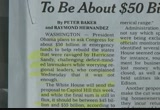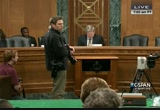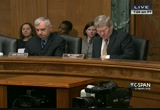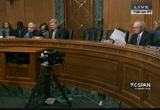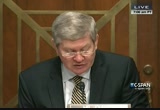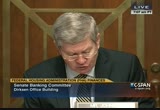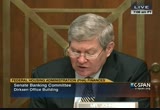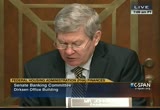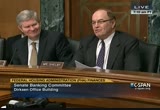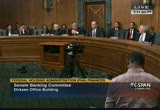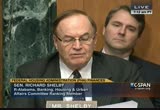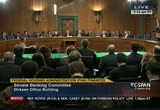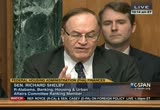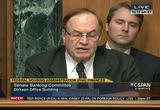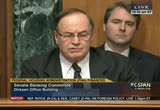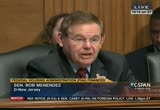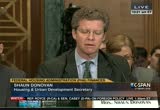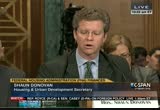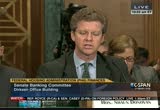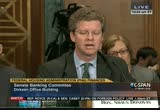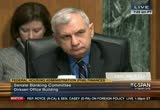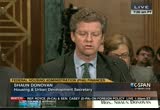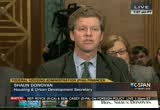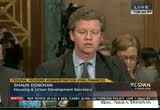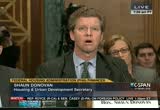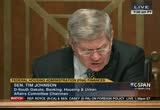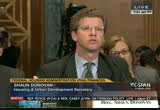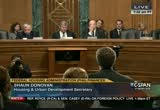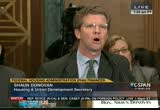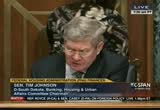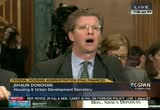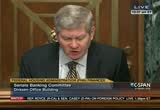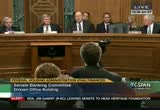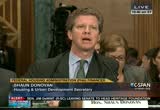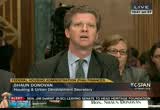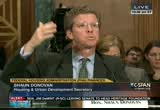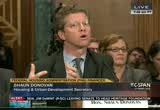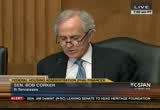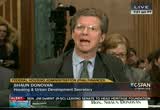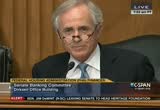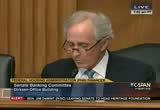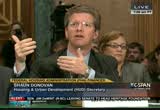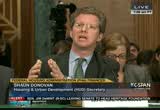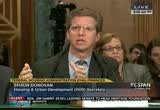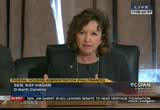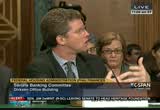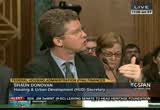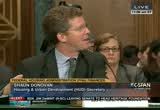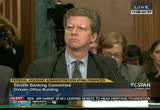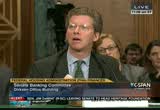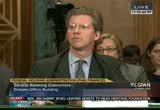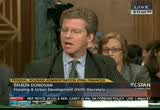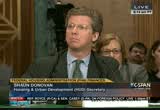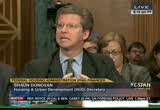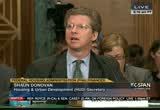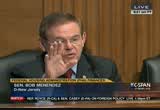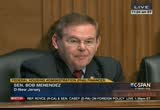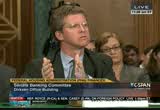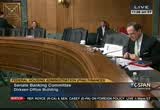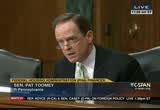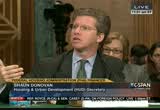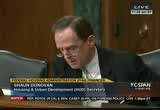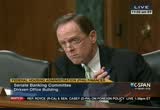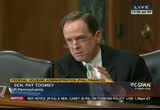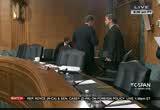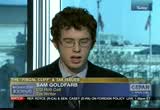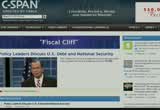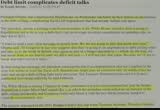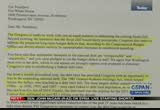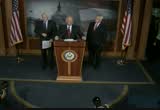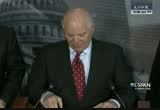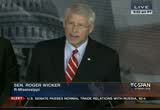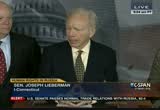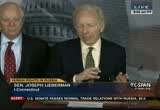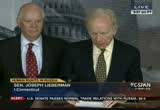tv Public Affairs CSPAN December 6, 2012 10:00am-1:00pm EST
10:00 am
debt. sovereign entity states and governments, countries, will have debt to finance the things they cannot pay for out tried. i used to work an invisible bond department of a wall street firm. there were all kinds of bonds, which is debt of cities and countries and states. of course there is the federal debt. as i recall, some people with fiduciary responsibility are only allowed to select investments that have very high ratings. the highest raiders in the world, at one time -- rated in the world, at one time, was the
10:01 am
united states of america. and widows and orphans funds will invest in government bonds. host: alma, thank you for your call. we will consider your suggestion. the senate banking, housing and urban affairs committee is about to hold a hearing on the oversight of the fha program. shaun donovan will be testifying. we will be going to that as soon as that hearing begins. i want to show you this article in "the new york times took ." president obama plans to ask congress for about $50 billion for emergency funds to help
10:02 am
rebuild the state's the were ravaged by hurricane sandy. regional leaders complained wednesday it was not enough. the white house will send the proposal to capitol hill this week. it should be between $45,000,000,000.50 $5 billion, according to officials -- $45 billion and $55 billion, according to officials. both democratic and republican lawmakers from the region quickly expressed disappointment in the pending request and lobby the administration to increase it before sending it to congress. sue in oklahoma on our line for independents. i think we have time for your point. caller: in a column today it
10:03 am
said that clinton's 2001 balance the budget spent $1.94 trillion. today the revenue is $2.67 trillion. spending is $3.76 trillion. we are spending $987 billion more than if we had just increased the 2001 budget for inflation and population growth. i understand about the mores. i am incensed, as i think most voters are -- wars. i am incensed, as i think most voters are. host: the chair of the senate banking, housing and urban affairs committee is in his seat.
10:04 am
10:06 am
10:07 am
i would like you to help the committee gain insight into the fiscal challenges at the f.h.a. and what h.u.d. has done and can do to mitigate losses and address the shortfall in the capital reserve ratio. f.h.a. has been helping save lives of the mortgage market by ensuring that qualified lower to moderate income and first time home buyers have access to credit since 1934. since the beginning of the financial crisis, the f.h.a. has increased its market share from below 5% in 2006 to about 30% at its peak volume in 2009, in pursuant of that mission. this cyclical expansion was essential to the mortgage market, especially for first time home buyers who have
10:08 am
comprised 78% of single family loans insured by f.h.a. in 2011. f.h.a.'s multifamily and health care insurance programs have also played an important cyclical role since the financial crisis with a fourfold increase in volume from 2008 to 2011. according to mark sandy, chief economist at moody's analytics, without the f.h.a.'s counter cyclical support, and i quote, the housing market would have quit taking the economy with it. providing the backstop for mortgage credit when public services flee from the market has a cost. the losses at f.h.a. to stem from the new now prohibited down
10:09 am
payment program, heavy losses in the first mortgage program, and losses -- loans made at the height of the crisis to prevent a collapse of the housing market. while they have already taken action to pretext the financial mortgage fund for single family loans from seeking federal funds, the f.y. 2012 report suggests that much more needs to be done to prevent such a draw. i want to hear more today about the administration's actions and proposals to minimize the risk to taxpayers stemming from their business and what safeguards are in place to ensure the quality and sustainability of the program. if the administration's actions and proposals will not be sufficient to restore f.h.a.'s
10:10 am
fiscal health, i'm inclined to work with my colleagues on both sides of the aisle on the banking committee to find a bipartisan way to make shoo -- that happen. before i turn to ranking member shelby, i want to recognize his work as ranking member on this committee over the past six years. this may be our last hearing together this year, and we will have no ranking member next year. i'm part of our bipartisan record over the last two years we continued it the tradition of bipartisanship that this committee has been known for by passing signature bills together this congress. and i thank senator shelby for his service. with that i turn to ranking member shelby. >> thank you, mr. chairman. first of all i appreciate your remarks. i have been on this committee 26 years, ending it, but i'm not
10:11 am
ending, i just have to move down a notch as i go over, hopefully, to be the ranking on appropriations. i won't be far away. i won't be far from secretary on h.u.d. stuff, either. but i enjoy working this committee. i enjoyed being chairman of this committee two congresses, the people on this committee are superb. the staffs are superb and this is a very important committee. not only for the senate, but for the american people and perhaps the world. as most people know, people are active on this committee because banking and housing and everything that goes with it goes right to the heart of what ticks in america. job creation, availability of money, the regulation of our banks, the securities and exchange commission t. money laundering, sanctions on iran, you name it. most of it, this is an active
10:12 am
committee, so i'll be around. right near here but i'll be yielding -- moving down one notch next to senator crapo, and will he do well. having said that, welcome again, mr. secretary. just days after the president's re-election, the f.h.a. released its 2012 actuarial report which revealed that the economic value of the f.h.a. fund has fallen to negative $16 billion. a lot of money. that means the fund's capital reserve ratio, as i understand it, now stands at a negative 1.44%. this news is obviously very disturbing to us and to the secretary. for those of us who have long been concerned about the health of the f.h.a. for years the problems of the federal housing administration have been well-known. during the housing boom, the f.h.a. unweissly, i thought, guaranteed -- unwisely, i
10:13 am
thought, guaranteed millions of risky mortgages with low down payments to borrowers with poor credit scores. we are reaping that now. these mortgages have resulted in billions of losses to the f.h.a. the federal housing administration has made matters worse, i think, by failing to come to grips with the magnitude, mr. secretary, of the problems. back in 2007, as the federal housing administration's poor financial position was becoming clear to all, including right here in this committee, i urged the f.h.a. to devise a credible plan to improve its finances. i stated then and i'll quote, that before the taxpayers are faced with greater loss, i believe we must determine how the f.h.a. got into this position, mr. secretary, and how it intends to get out. unfortunately for the past five years the f.h.a.'s leadership has understated their problems and sought to kick the can down
10:14 am
the road. this is now the fourth year in a row that the f.h.a. fund has been below its statutory minimum capital levels. yet each year we are told that this is a temporary dip and that within a few years everything will be fine. in fact, in 2009, mr. secretary, you told this committee that the drop in the capital ratio was expected to be, quote, temporary, and that it would, quote, return above 2% within the next two or three years, even if f.h.a. were to make no policy changes at all. we now know this forecast is way off the mark. the administration, however, continued to be optimistic. in 2011, for example, h.u.d. still had its projection showing the f.h.a.'s capital ratio reaching 2% in 2014.
10:15 am
now despite all these reassurances, the actuarial report projects that the f.h.a. fund has a capital reserve, as i meppingsed earlier, of a negative -- mentioned earlier, of a negative 1.44%. what is the response of the f.h.a.'s leadership here? just this year after further declines in the f.h.a. fund, both secretary donovan and acting f.h.a. commissioner carol gallant, testified to two different senate committees that the fund would, quote, return to the congressionally mandated capital reserve ratio of 2% by 2015. needless to say i'm not nearly as optimistic about the future of the f.h.a. i hope it works. i hope it does. the inability of f.h.a.'s leadership to clearly recognize and address its problems is raising doubts, mr. secretary, about the credibility and willingness to properly manage f.h.a.'s financing.
10:16 am
i think it's time for f.h.a. to face facts. we have to. first, the capital reserve ratio, the federal housing administration fund, is dangerously low. you know that. and has sha runge nearly every year since -- and has shrunk nearly every year since 2006. f.h.a.'s statutory obligations every year since 2008. third, every year since then future growth in the capital ratio has underperformed in relation to f.h.a.'s predictions. hopefully the shock produced by these latest projections will finally be a wake-up call for everyone. hard choices lie ahead for this program. we have talked about this. f.h.a. leadership, i believe, must fully realize its existing authority to shore up the value of this fund. additionally, congress must consider reductions in permissible risk layering and
10:17 am
further underwriting reforms and re-examine -- re-examination of premium structures. it's time, i believe, to get serious reform of f.h.a. before it needs a taxpayer bailout, if it isn't too late already. i wish you well, mr. secretary, but you have a real challenge here. we do with you. thank you. >> thank you, senator shelby. are there any other members who wish to make a brief opening statement? >> thanks, mr. chairman. just briefly i want to agree with the comments of our ranking member, mr. shelby. and our general concern is that we have seen this coming for a while. we have been talking about it. and the response from the administration has been very modest. unfortunately our worst fears are coming true, and even today i'm very concerned that the response even given this news is
10:18 am
just way too modest. in discussing last year's actuarial report, the acting commissioner, carol gallante, said there is no evidence or widespread prediction that home prices are going to decline to the kind of levels that would require a bailout. yet right now the question is quickly becoming not if but when. and still even in the testimony -- secretary's testimony today, we are only talking about things like waiting until the second quarter of next year to raise premiums and then it by 10 basis points. i really urge the secretary and others to consider other more aggressive, more proactive measures. mean "the washington post," which is not exactly a right wing think tank, said recently, quote, right now the critics are
10:19 am
starting to look pretty prescient. affordable possession of one's own home is the american dream. government support excessive borrowing has turned into a national nightmare, close quote. and the focus of that editorial was, we still haven't fundamentally reformed that, including at f.h.a. so i hope we start getting on that track starting today. thank you, mr. chairman. >> senator menendez. >> thank you very much. i'll be brief. i look forward to hearing the secretary's response on how f.h.a. balances the goals of remaining self-sufficient without taxpayer funds, but also helping what is still a fragile housing market in ensuring first-time home buyers can get credit. there is a clear case to be made in my mind that but for f.h.a. in the midst of this housing crisis, we would have a far
10:20 am
greater crisis on our hands. and so wreck siling -- reconciling the fiduciary responsibilities here to the taxpayers as well as the mission to people of america is incredibly important. i look forward to hearing that. and with your indulgence, mr. chairman, when it comes to my time in questions, while i certainly care about f.h.a., i have a even more pressing issue in the state of new jersey after thousands of homes were lost, lives were lost, and we are facing the greatest devastation the state has ever had. the secretary has been charged by the president in that regard, to be the, i call it, czar, but whatever the appropriate title is, and i will have some questions in that regard on behalf of my state. thank you. >> thank you. i want to remind my colleagues that the record will be opened for the next seven days for opening statements and any other materials you would like to
10:21 am
submit. now i would like to briefly introduced our witness, the honorable shaun donovan is the 15th secretary of housing and urban development. this is his ninth time before the full committee. secretary donovan, you may proceed with your testimony. >> mr. chairman. thank you, ranking member shelby, members of the committee, thank you for the opportunity to testify today regarding the status of the federal housing administration's mortgage insurance programs. i, too, want to add my thanks to ranking member shelby for his leadership and partnership on so many issues these last few years. this is an important moment for our housing market and our nation's economic recovery. as 2012 draws to a close, there are encouraging signs. housing construction growing faster than any time since 2008. the strongest year of home sales since the economic crisis began. and rising home values lifting 1.3 million families above water in the first half of the year
10:22 am
alone. f.h.a.'s programs have been a critical component of this recovery. that should come no surprise given the program's goals and history. with the dual mission of providing access for homeownership for underserved populations and critical financing for multifamily developments, nursing homes, assisted living properties, and hospitals, the f.h.a. is designed to fill gaps in the market, meet important commute needs, and act as a stabilizing force during economic distress. it's clear that f.h.a. has done just that. by ensuring much needed liquidity in the nation's mortgage finance markets, f.h.a. was a vital stabilizing force as we experienced the worst economic decline since the great depression. in the last four years, the f.h.a.'s made homeownership possible for over 3.5 million families, including 2.8 million first-time buyers, and for 50% of all african-american and latino home buyers last year. while f.h.a. has acted as a critical support, it has not been immune to the stresses of falling home values and rising
10:23 am
unemployment of the recession. according to the independent actuary's annual report on the m.m.i. fund, this fiscal year, the capital reserve ratio fell below zero to negative 1.44%, representing a value of negative $16.3 billion. we take and i take these findings extremely seriously. as stewards of taxpayer dollars, we have, since the start of this administration, made it a priority to strengthen the fund. and we are continuing to take aggressive action to return the fund to fiscal health, including those measures just announced in our annual report to congress. it's important for me to start by highlighting several key points that put the actuary's report in perspective. fully $70 billion in claims are attributable just to the 2007 to 2009 books and business. these three years are the major source of stress to the fund. in fact, in its report, the actuary attests to the high quality and significant profitablity of the books
10:24 am
insured since 2010, the strongest in the agency's history. it's important to understand this report does not in and of itself mean it will be necessary for the f.h.a. to use its authority to draw from the treasury to cover projected losses. while this possibility obviously exists, it is dependent on several factors. first, that determination would be made using the assumptions in the president's budget to be released in february, not the assumptions used in the actuary's report. second, we expect that the new books of business generated after 2012 will create approximately $11 billion in economic value, further strengthening the m.m.i. fund. third, since the actuarial report is a point in time snapshot, it does not take into account changes f.h.a. recently has announced to address the health of the fund. the final accounting of any shortfall would be done at the end of fiscal year 2013 in order to determine whether funds from the treasury are necessary. i'd also like to address the primary drivers of the decline
10:25 am
in the capital reserve ratio as compared to last year's projections. first, the house price appreciation estimates used by the ackture wary for this review were significantly lower than those used last year. that may seem counter intuitive given the economic progress we have seen, but the actual turn around in the market occurred later than was projected in last year's forecast. in addition, for technical reasons, the forecast is also somewhat artificially dampened by the significant increase in refinancing activity in the market this year. second, the continued decline in interest rates while good for the overall economy impacts the ackture wary's model by indcading marginally higher results -- indicating marnellally higher results. third, based on recommendations made by the g.a.o. and hud's i.g., and at the direction of f.h.a., in this year's report the actuary changed the way it reflects losses from defaulted loans and reverse mortgages in the economic value of the m.m.i.
10:26 am
fund. let me be clear, these are all important factors to consider when explaining the current status of the fund, but they do not minimize the seriousness of this report in any way. as i said at the outset, we have already taken significant actions to protect and strengthen the fund, including premium increases and changes to credit policy, such as increasing down payments for lower credit scarboroughers, and ending seller financed down payment assistance. with your help, our efforts have added well over $32 billion to the fund. the measures i will outline today further address the primary source of the problem. losses stemming from legacy books and business, particularly those insured during the 2007 to 2009 period and are designed to reduce our loss cevaerities by at least 5%, generating approximately $3 billion in economic value over the next two years. first, we have announced changes to our loss mitigation program that targets deeper levels of relief for struggling borrowers to more effectively assist families in meeting their
10:27 am
obligations and avoid costly foreclosures for f.h.a. similarly we are streamlining the use of short sales and aligning our practices recently announced to provide more families the opportunity to avoid foreclosure while reducing costs for the f.h.a. we have dramatically increased the use of alternative dispositions for defaulted loans, including our new distressed asset stabilization program. the improvement in recoveries from f.h.a. to this program is estimated over $1 billion this year alone. we are also taking proactive measures on new loans. in particular we are reversing a policy change made over a decade ago that allowed borrowers to stop paying premiums after their loans reached a certain loan to value ratio. this change left the f.h.a. without premiums to cover the losses on loans held beyond the period for which those premiums were collected. reversing the policy is expected to improve the val uste fund by $2.6 billion -- value of the fund by $2.6 billion in this fiscal year alone. in addition, we'll raise our annual mortgage insurance
10:28 am
premiums by 10 basis points. we estimate this will increase cost to new borrowers by about $13 per month, but it will also further reduce our footprint in the market while adding an estimated $1 billion of additional economic value to the fund this year. as private capital returns, f.h.a. must continue to balance pricing to ensure it occupies a smaller, healthier share of the market. in fact, f.h.a.'s market share has been declining since 2009 and 2012 represents our lowest volume year since the start of the economic crisis. while i focus today on f.h.a.'s single family programs, i wanted to take the opportunity to reassure the committee our efforts to protect our insurance funds span the range of our programs. we have already raised our mortgage insurance premiums on multifamily and health care loans, and instituted other risk management reforms such as special reviews for large loans, post commitment reviews by credit risk officers, and enacted loan -- an active loan committee process. even as we use our existing authority to take these measures to protect the fund, other
10:29 am
actions require your partnership. in addition to the increased indemnification authority and broader geographical enforcement powers recently passed by the house, we have a number of proposals designed to place f.h.a. in a stronger fiscal position over the next 12 months and beyond. including new loss mitigation authority, additional enforcement authority, and greater administrative flexibility in managing the reverse mortgage program. house has recently passed important bipartisan f.h.a. reform legislation and we look forward to continuing to work with both chambers to create the tools we need to strengthen the program, meet its mission, and place the m.m.i. fund back on firm footing. i encourage the senate to engage in discussions that build on this progress in the house in order to achieve a consensus that will give f.h.a. these tools as quickly as possible. there are no guarantees that the actions i have described will prevent f.h.a. from tapping into the treasury next september. however, swift action from congress, cuppled with the $11 billion in additional value from
10:30 am
the new fiscal year 2013 business, will reduce the likelihood that a treasury draw will be necessary. furthermore, these changes, as well as those we made over the past four years, have laid the foundation for a stronger f.h.a. and a healthier m.m.i. fund that supports the recovery of the housing market and economy, while actively reducing f.h.a.'s market share. as we work together to adapt and reform the f.h.a. program, we must proceed with a balanced approach that recognizes both the challenges to f.h.a. and its contributions to our economy. we are eager to work with you to achieve these shared goals. thank you again for the opportunity to testify today. i look forward to taking your questions. >> thank you for your testimony. as we begin questions, i will ask the clerk to put five minutes on the clock for each member. secretary donovan, i'm very concerned about the f.h.a.'s fiscal condition as detailed by the f.y. 2012 report, particularly the negative capital reserve ratio.
10:31 am
what action have you taken to restore f.h.a.'s capital reserve and prevent f.h.a. from requesting taxpayer support? >> mr. chairman, the most important actions that we have taken have been in partnership with this committee, and i would particularly recognize the fact that you passed a ban on seller funded down payments, which went into effect and we implemented in 2009. that action alone, we believe, has saved the f.h.a. fund about $12 billion. there are additional actions that we have taken. we have raised premiums four times. made underwriting changes that include raising down payments for the riskiest borrowers. that series of changes has added, we estimate, an additional $20 billion to the
10:32 am
value of the fund. quite simply, if we had not taken those actions in partnership with you, we would find ourselves in a vastly worse position today for the f.h.a. fund. >> mr. secretary, you have detailed several steps that would help stabilize f.h.a.'s finances. given the condition of the f.h.a.'s old books of business, why weren't these changes made earlier? will these changes allow the f.h.a. to outperform projections again this year and avoid drawing funds from the treasury? >> as i said in my testimony, i cannot guarantee that we won't need to draw at the end of the fiscal year. what i can say is that i believe we are taking all appropriate steps to try to avoid that. balancing both the health of the
10:33 am
fund but also the fragile recovery that we have in the market. for example, we have already moved to increase premiums for the fifth time. we believe that that is an appropriate step and that it leaves f.h.a. appropriately priced. we would be concerned, however, about going significantly further in raising premiums, both because it would have potential negative impacts on the housing market. we are seeing a recovery, but it is still fragile, and we do not want to hurt the market and in turn hurt the f.h.a. fund by going too far to stop that recovery. but i would also suggest, as you see in the chart, on the right, we are currently, and the independent actuary confirms this, that the new books of business are highly profitable. and so i think there is beyond
10:34 am
the market question a question of how far do we go in visiting the sins of the past on new borrowers? the premiums being paid by new borrowers more than cover the expected losses. we think that's appropriately priced and will help to shrink our market share, but what we need to do is continue to focus on these older books of business and that's why i focused in the changes that we have made we announced in our report to congress on steps that will increase our collections from these older books of business. just from the asset sales that we have instituted and were going to ramp up going forward, we have increased the returns on these distressed loans by mortgage than 10%. simply with those steps. so we need to continue to focus on things and we have asked for authority from you to take steps that would help increase our returns on the older books of business. we think those are the most appropriate measures we can take. >> secretary donovan, one of
10:35 am
these steps is better loss bit myth gation by transferring insurancing from servicers who are underperforming. what is preventing f.h.a. from doing that under its existing servicing contracts? >> quite simply we need legislative authority to be able to force those transfers to happen. that is a critical step. it is something that we have seen in the private market start to increasingly happen. it's something we believe would be very helpful to send a very strong message to those servicers that are underperforming. but it is one of a number of a steps that we would ask that you give us legislative authority for as quickly as possible. >> one more question. secretary donovan, the act wearial report finding of --
10:36 am
actuarial report finding of the negative in the m.m. 1 fund is mainly problem legacy loans guaranteed during the housing bubble. what steps has f.h.a. taken to improve its underwriting dry teara and risk assessments -- criteria and risk assessments for the new loans? >> as i mentioned earlier, clearly the steps that you took to ban seller funded down payment loans were a critical piece of that. we also looked at the performance of our loans very carefully. so in addition to the premium increases, we did require a 10% down payment for our riskiest borrowers. that we believe was a very important step in changing our underwriting. we also have taken many other steps on other aspects of
10:37 am
underwriting that have to do with what costs can be rolled into the loan and other steps that reduce the effective risk of those loans that are quite important. part of that has been able to be done because, quite frankly, we didn't have a strong enough risk focus at f.h.a. in the midst of the crisis. we have created a very strong risk management focus through the creation of a chief risk officer for f.h.a. that's never existed before. as well as building a team of analysts that are really providing data on an ongoing basis on early payment defaults and a whole range of other information that we simply didn't have before in real time. so it's not only the underwriting changes themselves. it's also the focus on risk and the way that we are measuring it
10:38 am
on a real time basis that has given us new tools. >> senator shelby. >> thank you, mr. chairman. secretary donovan, lead me through this. tell me if i'm wrong on this or right or what. it's my understanding that under the statutes now prevailing that the federal housing administration could, if necessary, you deemed it necessary, tap the treasury for an endless supply of money. a lot of us would call that a bailout. do you anticipate that? can you assure us and the american people today as the secretary of h.u.d. that f.h.a. will not do that? or you don't know yet? >> senator, i wish i could -- hi a crystal ball and coy tell you that we won't at the end of the year. given the actuarial report this year, obviously i'm highly
10:39 am
concerned about that possibility. >> getting close? >> certainly we are closer than we have been in the past. >> how close are you? >> well -- >> honestly. >> what i will tell you, again, an independent actuarial report is the best can i give you in terms of that view. >> that's not good, is it? >> what it says -- >> the actuarial report is not good. >> it isn't. one important piece of this is that the -- what is required for the actuarial is a review as if we stopped doing business on the date of the actuarial. the important thing that we can do and that we have done to try to avoid taking funds from the treasury at the end of the year is to look at the revenue we expect this year, that's about $11 billion, and to make changes to underwriting and other steps
10:40 am
that would help avoid that. >> does that include up in the premium -- upping the premium a little? >> we have already moved to increase the premium an additional 10 basis points, an average of about $13 a month. >> how much money would that be projected? >> that would add about $1 billion just this year alone. and much more into the future. >> what is the size of your portfolio today, roughly? >> it is over $1 trillion when you combine -- >> $1 trillion worth of loans? >> when you combine all the various programs. >> how much -- how close are you as far as working capital so to speak? >> it's an important question. today, even though the actuarial report shows a negative balance, we have a cash balance of over $30 billion today. $30.5 billion. one of the things the actuary
10:41 am
looks at, assume we continue to do business, assume that we continue to operate, what is the likelihood, obviously we plan to continue to operate, what is the likelihood that we actually -- the cash balance goes negative? and the actuarial, despite the worst condition this year, still has a less than 5% chance that we actually run through all of those cash reserves. >> gives us the worst case scenario. it's the first week of december now. say three weeks, what's your worst case scenario, getting up to the first of the year, where you might be or not be? what would cause you to -- cause to you have a lot of heartburn say around the first of the year? >> the single greatest issue of concern is where the housing market will go from here. if the housing market continues to recover as it has this year,
10:42 am
that's the most important thing that we can see to restore the fund to health. house price appreciation is the single most important variable in the health of the fund going forward. it that is also why i will say we are so concerned about balancing the steps that we are taking to make sure we are not doing anything that would impede the recovery and come back and harm the f.h.a. in the long run by decreasing the improvement that we see in housing markets. >> we all realize that f.h.a. serves a good purpose, but it's just not sound financially. as the secretary of h.u.d., shouldn't the fiscal well-being of f.h.a. be one of your highest priorities? >> absolutely. absolutely. >> you're just going to deal with what comes up like you outlined today?
10:43 am
>> i would welcome additional ideas and suggestions that you may have. i certainly feel that we will take steps within our power. we would like to work with you, as i have said, as quickly as possible, to move additional authorities that would help us do this, but i am also opened today or any time to additional suggestions about what further steps we could take. >> if you do tap the treasury, in other words there's a bailout, so to speak, it's a sizable one, how would you pay that money back? premiums? better efficiency? the housing recovery? all of the above? >> we certainly believe that we need to keep f.h.a. in a position where our new books of business are producing substantial revenue for the taxpayer. this year alone we expect our new loans to return a $10
10:44 am
billion profit, if i could use that term, to the taxpayer. that is the way that we need to continue to restore the health of the fund and should we need to draw on the treasury to restore that money to the taxpayer. >> thanks, mr. chairman. >> senator reed. >> thank you very much, mr. chairman. thank you, mr. secretary. i repeat what my colleagues have said. it's very disturbing to have a report that shows 1.4% negative equity at a critical fund. and this is an issue that has not suddenly emerged. it's been brewing over several years. you have indicated that you are taking steps to fix these problems. and many people have said that in the past, too. again, can you sort of give us
10:45 am
some assurance that this time is different? >> what i can say, senator, is that i believe we are taking every responsible measure that we can to improve the health of the fund. while at the same time not hurting the fragile recovery that we have. i do not have a crystal ball and i believe that we need to continue to take input and guidance on getting a better picture of the fund. one of the reasons why the fund looks significantly worse this year than it did last year, we got criticism last year from outside experts, from the g.a.o., from our i.g. of the way that we model claims in our actuarial. we went back and directed our actuary to change the way we model, and that alone, that change alone, sub tracted $13
10:46 am
billion from the value -- subtracted $13 billion from the value of the fund. i'm not going to sit here and say we have been perfect in the way we looked at the fund or we have modeled it. one of my responsibilities is continue to make changes to get as accurate a picture as we possibly can and to take steps based on that. >> let me ask perhaps a related question, as you look forward in terms of the health of the fund, one fact would seem to me, i would assume it would be explicitly in the model, would be assuming about employment rates going forward. what unemployment rate are you assuming over the next year or so? because it directly affected payment -- >> absolutely. one of the important changes we made to the model this year not to get too wonky here, is to go to something called sacastic modeling.
10:47 am
we chose one path and modeled based on that. state of the art modeling, assigns probabilities to a whole different range of paths the economy might go through. we actually modeled a vast range of scenarios. one of the things we looked at last year that we directed our actuaries to look at last year was to say what if interest rates go low? what's going to happen to the fund? we ran that last year. that scenario predicted that the fund would go negative. in fact, we have had what is effectively the low interest rate scenario happen this year with qe-3. that was clearly had a substantial impact, roughly a $10 billion negative impact on the fund just from those interest rates alone. those are clearly steps that we are taking. we would be happy to share with you the various unemployment rate scenarios that we are looking at and home price paths we are looking at, but again we look at a range of those to get to the best possible prediction.
10:48 am
>> you got close to wonkiness with sacastic modeling. one of the problems that you face is this series of years of terribly mispriced loans in 2007, 2009. and it would seem to me one of the things that you are trying to do is to clear these as quickly as possible. but as you have indicated to us, you need help with servicing. that you have to do much more aggressive modification, sales, and also for the real estate that effectively alone, you have to dispose of it. can you comment on how much you think you can achieve in relieving pressure on the fund by doing that? looking back and taking care of that period? >> we think with a set of changes that we are already taking, that we announced in our report to congress with the actuarial, that include the loan
10:49 am
sales that we have taken, changes to short sales, changes to what we call our loss mitigation waterfall, how we work with borrowers that are in trouble, those alone could add about $3 billion to the fund over the next couple years. what we need help on is that many of our enforcement authorities, and again if you think about how we collect on the bad loans, enforcement is an important piece of that. to say to lenders, you made a bad loan, there was fraud or something else involved, we need to hold you accountable for that and bring funding back to the taxpayer. there are a number of provision that is would help us. one is giving us broader geographic authority. we have some perverse restrictions right now in legislation in terms of the way that we can hold lenders accountable on a narrow geographic basis. what we can do to require indemnification of loans, the
10:50 am
standard for fraud, those are all pieces of what we would want to work with you to get past very quickly -- passed very quickly to enhance our enforcement authority. those as well would likely add billions of dollars to the fund. as you know we have been able to recovery well over $1 billion just this year in settlements around servicing and originations with many of our biggest lenders. >> thank you very much, mr. sefpblgt thank you, mr. chairman. >> -- mr. secretary. thank you, mr. chairman. >> thank you for your testimony today. you asked for some suggestions and i'd like to make just a few. it's my understanding that on the private side right now fico score is really at 620, where the market is. and f.h.a. is at 580 and basically it's creating a situation where the private lenders are being made out to be bad guys because even though
10:51 am
your fico scores are 580, they are not doing anything before -- below 620. as one of the steps that you might take, would it make sense for you to go ahead and get on up to 620? right now there's huge demand out there, and at some point that's going to diminish and will drive back down as people try to get market share again. would it not make sense to go ahead and implement what the market is telling you to do? >> that is something that we are actually looking at. i think it's likely that we take additional steps as we are working towards the president's budget and understanding in more detail the results of the actuarial. that is clearly something we are looking at. we are concerned that some of the overlays that lenders are putting on go farther than are necessary. in other words, we do believe that there's been an overdirection, if you will, in
10:52 am
some parts of the market, where we have what are very safe borrowers that are having a hard time accessing credit. but i also agree that we need to be looking at and perhaps adjusting on the fico side as well. >> generally for what it's worth, i appreciate your testimony today. i know we have had discussions about that sometimes in the past. and i do realize you had a lot of bad loans on the books that you inherited. i do think there are things you can do now to really cause the fund to be more -- far more sound. i do think you all are being slow in moving that way. a second one i would move to is reverse mortgages. you are losing your shirt on reverse mortgages. losing your shirt. it's a small part of what you're doing, and yet you've got mortgage brokers out there that are making an absolute fortune right now, a fortune. some of them are good operators. a lot of them are sloppy operators. i don't understand why you don't shut the program down for 24 months as i know has been suggested to you?
10:53 am
why don't you do that? >> once again, senator, you have hit on an issue that is an important one and that we do believe we need to make changes. >> why don't you just do it? >> frankly, we did make changes. we introduced a much safer, better, we thought, alternative through our safer -- saver program. we could effectively do what you said, which is to just create a moratorium on the other program. what we are concerned about is particularly given the economic crisis that seniors have gone through, that we would be eliminating an option that works for some seniors, if it's done safely, in order to eliminate also the bad loans being made. our preference, if we could get authority from you to change the structure of the program to make it much more effective and safe, that would be a better way to go. if we can't get that authority
10:54 am
quickly, we'll have -- >> i would think -- why can't we do a unanimous consent, it seems to me most people would be willing to do that? >> let's talk about that today. i would love to -- >> i know you've got a partial situation that has been very healthy. it seems to me if you're worried about seniors, you could keep the ability to draw down a partial amount which is very safe, and you would eliminate -- you could do that all by yourself. and we could worry about the legislation whenever it's time. i'm willing to look at it now. just for what it's worth it does feel like there's a lot you could do to make f.h.a. healthy today that is not being done. let's talk further, ok. loan limits. seems like right now, fannie and freddie are down at 625. are you still up at 729. wouldn't it make sense to go ahead now and make some changes that need to be made? you can do that yourself. why don't we do that?
10:55 am
>> as i think you know, we supported our loan limits coming down. and they were supposed to expire last year. congress made the decision to allow -- lower the g.s.e.'s loan limits but kept f.h.a.'s -- >> can you self-implement that? you cannot do that? >> i do not believe that given that congress explicitly extended those higher limits, that we can take that step. >> would you like for us to help you do that? >> we have supported before and i will state again today that going back to the limits makes real sense. i will go further than that, that we should lay out a path to go back to even lower limits that existed before the crisis in a way that is done consistent with how we do housing finance reform. that is is larger question. but the immediate step of going
10:56 am
back to the pre-era limits is one we would support. >> are you developing a fan. and i hope we could look at some of those things. home mortgage insurance. the way i understand that it works is private mortgage insurers when you get down to a certain loan to value ratio, the insurance -- the premium is dropped, but also the insurance is dropped. and yet you have a trillion dollars in loans on your books where the loan to value has dropped. they are no longer paying premiums, but you are keeping the guarantee in place. that doesn't make any sense to me. and why don't you continue to make the homeowner, who has that guarantee, continue to make the premium payments? that would be something that seems to me would be extremely helpful to you during this difficult time. >> once again, an excellent suggestion. we announced with our report to
10:57 am
congress that we were -- we are doing that for new loans. >> why not the ones on the books? >> unfortunately we can't go back and modify a contract. when that homeowner took that loan, they signed a deal with f.h.a. that said this is the way the premium structure would work. we looked at this. we fully analyzed it. we can't break those contracts, unfortunately. and so it's something that we are going to need to implement. i will say, however, that the value of doing it now in a low interest rate environment is substantially larger on these new loans for two reasons. the lower the interest rate, the faster the am more at thisization of the principal and therefore this will be a more valuable change. second because these loans are so low interest rate, they will be on our books far larger. frankly, not many loans in the past have hit that limit. so even though it's $1 trillion portfolio, the value of that change is quite small for the old loans. it's really going to be quite
10:58 am
valuable for these newer very low interest rate loans. >> i'll be briefly two more questions. i see that f.h.a. is now making loans to people who three years ago were foreclosed upon. and that's a very different standard than even exists at fannie and freddie. i don't understand. why are you doing that? >> this is another area where we are working on changes. here's the issue. we have a significant number of homeowners that were responsible homeowners, had good credit scores that lost their jobs in the biggest economic crisis this country has faced since the depression. and we believe if somebody can show that they are back at the work and responsible borrower again, that that's somebody that we ought to work with. i would agree that our standards
10:59 am
are not clear enough in dividing those. so what we believe we need to do is clarify those standards but not necessarily eliminate the possibility that somebody who has done the right thing and through no fault of their own lost a job but can be a responsible homeowner again, has the chance. my view would be it's not just the three-year limit that's important, it's what are the criteria that we set for how somebody re-establishes their credit and being a responsible homeowner? >> my last question, thank you for your patience. first of all it sounds like there is a lot of things -- there are a lot of things that could be done right now to solve a lot of problems. and i hope that we as a committee will figure out a way to work with you on those things. we need to work with you. but you can do the things you can do now. you and i had a pretty long conversation several months ago when carol gallante had the opportunity, candidly, to assume her post on a permanent basis.
11:00 am
and we could not get the administration to agree to not airdrop something and bypass the committee. it's an unfortunate circumstance. but i guess as i look at it, i would just ask you the question, did we dodge a bullet in appointing her full-time with all the issues that we have at f.h.a.? and does she really have the ability to press the administration to overcome political issues to actually cause the fund itself to be ack actuarially sound? because it appears to me that we are still not quite doing the things we ought to do to make the fund operate. it seems to me maybe there's a little political pressure and maybe she's not strong enough to make thatp. . >> we have taken the most aggressive steps i think in the history of the agency to make sure the new business that
11:01 am
we're doing is strong. if you look at that chart right there, what you'll see is huge profitability relative to the history for the new loans that we're making. we have only so much that we can do to fix the problems of those older loans. so i agree with you on many of the steps that you described today. what we shouldn't imagine is that somehow taking those steps can take us from the difficult financial condition that the f.h.a. finds itself in today, somehow to eliminating what has been an enormous trauma in the housing market. i have enormous confidence that carol can and will lead us to that -- on the path that we need to take and in fact you don't have to take my word for it. i think the evidence of the changes that we have made, the steps that we took, you remember last year the
11:02 am
president's budget thought that we might need a draw at the end of last year. carol took aggressive steps on enforcement, on changes to underwriting, that meant instead of a negative close to a billion-dollar balance, we ended the year with a more than $3 billion positive balance. those were aggressive steps that she took. i listened to her but she took those. and i believe that that's the kind of leadership that can help us continue down this path. >> thank you. senator hagen. >> thank you, mr. chairman. and, mr. secretary, thanks for your testimony today. i know that senator corker asked about reverse mortgages. and i am concerned about that issue and i'm particularly concerned that $2.8 billion of the $16 billion economic shortfall are related to that program. can you talk a little bit more about why these losses under the reverse mortgage program are so is he rear?
11:03 am
>> here's the fundamental problem. without getting into too much of the history. at one point when fannie mae was issuing these loans, they were generally variable rate and they could -- they allowed a borrower to basically draw on a, you know, over time, the amount of money that they needed. as that program has switched to being a ginny may program, there is basically no option for those borrowers to do anything but draw the full amount. >> and why? >> because we don't have the statutory authority to be able to make the changes to the program that would allow us to limit the draw up front. that's the change that we're asking that be made. our alternative, and i was just discussing this with senator corker, we could basically eliminate or put a moratorium on our regular program and just go to what we call our saver
11:04 am
program which is somewhat safer. but the problem is, we still don't have the authority even under that program to avoid this full draw feature of it. and -- so the right answer in our view is, give us the authority to make the changes we need so that we end up with what is a safer product for s.h.a. and frankly a safer and better product for seniors. what we're finding is with this full draw product too many seniors end up in situations where they can't cover their insurance and their taxes and too often we lead to a situation where they have more leverage, more debt, than their home is worth by the time they're ready to sell that home. >> so you're saying because of that change, that's what resulted in the huge $2.9 billion. >> that is for many of these -- for most of the new loans that we're making, they're at this full draw and they -- the actuary predicts they're going to be enormous losses on those
11:05 am
going forward because of this full draw feature. >> ok. and also, the last time you testified before the committee, we discussed the national mortgage settlement. can you talk briefly about the m.m.i. fund, how it's benefited from the settlement? >> in the most direct way it's benefited by well over $1 billion that came directly to the fund from that settlement. or that series of settlements. also important, though, is we put in place not just for fmplet h.a. loans but for -- f.h.a. loans but for every kind of loan that were serviced by the banks that were part of it, new standards for how they foreclosure on loans, how they work with troubled borrowers and in the long run those
11:06 am
changes will have very important affect not just for homeowners and communities but also benefits to the f.h.a. fund because we will have fewer foreclosures and better recoveries on the loans, whether it's in short sales or keeping home owners in their homes. >> the settlement also includes billions of dollars in debt forgiveness for the borrowers and generally discharge of indebtedness is taxable to borrowers but certain exceptions exist for indebtedness related to principle residencies. this is set to expire at the end of this year. what's the interplay of the expiring tax provision and principle reduction for borrowers and how would the expiration of that provision impact participation in the settlement and the relief that borrowers -- >> it would be a cruel irony if homeowners have the ability to stay in their homes because of a principle re-- principal reduction that is both good for
11:07 am
them and their lender because it's going to lower the losses on that loan in the long-term. only to get, come tax time, a giant tax bill for that principal reduction which drives them back into the delinquency and potentially foreclosure. and so the president has made it a real priority to try to get that provision into the tax -- whatever tax extenders we may do at the end of this year. and it is a very high priority for us among the many things that will be at issue in that tax extender. >> thank you, mr. chairman. >> senator. >> thank you, mr. chairman. thank you, mr. secretary. again, as i said at the beginning, i have the real concern that i think is shared by a lot of committee members. that the changes in reform, f.h.a., has made, you're
11:08 am
talking about today, aren't significant enough given the looming threat. and you say they're unprecedented. that could -- both of those things could still be true. they could be more than ever before and still not enough given the magnitude of what we're talking about. and that's the concern. first of all, let's talk about the clear potential now for a taxpayer bailout. is it not right that under the federal credit reform act it would allow the treasury to make necessary cash or credit transfers to f.h.a. in order for them to continue making payments sort of automatically? >> that's absolutely correct. that is the way not only f.h.a. but other similar programs are designed. >> that's obviously significant for the taxpayer. we all care about that. can you commit to us that you'll keep us and the congress fully apprised of your moving
11:09 am
projections with regard to that and certainly fully apprised when that happens? >> i'm absolutely committed to make sure that if we're going to take that step, that you would be fully notified. >> my question was a little more than that. it was to keep us fully apprised of your current and updated projections toward that issue. can you commit to us to give us that information, your best projections, today and whenever that changes and certainly if that's going to happen? >> i do and, senator, what i would suggest, we do provide a monthly report to congress on the status of the fund. if there's additional information or somewhat different information that would be useful to you in that, we are very happy to work with you on that. >> ok. well, what i'm talking about is as of today, when do you project that's going to have to be a taxpayer-funded bailout? what's your best projection?
11:10 am
>> what i would say is our best projection will be contained in the president's budget. we are still working on the underlying economic assumptions that go into that. and so i don't have anything beyond what the actuary did that would be a different prediction to that. >> so today with an all of h.u.d. and all of f.h.a. you have no best guess about that? >> i'm not sure what you would suggest is a best guess other than to say the actuaryial report has a value of the fund as of the date it was performed, in addition to that we expect about $11 billion of new revenue and the changes that we've implemented we believe will bring billions of dollars of additional revenue to the -- >> based on all of that, do you expect a taxpayer bailout as we
11:11 am
sit here today? if so when? >> based on those steps, i believe we have significantly decreased the chance of having a bailout at the end of 2013 or having to draw on the treasury. i'm not going to assign a probability at this point because we are still working on the assumptions and other steps in the budget and i will be able to give you a number when we've completed the budget projection. >> again, i want to reask for your best information about that as it develops. and unfortunately we don't have that today. i think y'all have some idea, some best guess, you're not giving it to us. we'd really like that as soon as you can give it to us and from then on, on an updated basis. with regard to changes that are being made, you just said they're unprecedented and the proof is in the pudding and the changes that were meat in the last year -- made in the last
11:12 am
year stepped us back from that possibility. i just want to add for the record, there was another big factor, $1 billion in the a.g. settlement. that was underfound money. it was a huge factor that had nothing to do with reforms or changes. but i also want to associate myself with senator corker's suggestions about a whole menu of things that we believe exist that y'all are not doing that i believe is warranted. there's several ways, and senator corker touched on this, that f.h.a. has much laxer standards than fannie mae and freddie mac. and as a result are you creating a huge magnet to draw the worst problem loans to f.h.a. because of that. one of those is maximum loan limit and another is the issue he brought up of allowing a borrower to reborrow three years after a foreclosure. fannie mae and freddie mac, that's four to seven years. on those two things and anything else like that, why
11:13 am
wouldn't you align f.h.a. with fannie mae and freddie mac to stop this negative selection that is occurring toward f.h.a.? >> senator, two things i would just say. one is, it's not accurate to say that the reason the fund remained positive last year was because of the settlement. the value at the end of the year was over $3 billion. if the settlement had hadn't happened we still would have been positive and the second thing i would say with is i don't see the settlement as unrelated to policy changes. strong enforcement is particulate of what we need to do -- part what have we need to do to make sure that we hold lenders accountable and that we minimize losses from those older books of business which are causing the stress to the fund. and so i believe very strongly it was the right policy decision. it is related to steps that we've taken. and even if it hadn't happened, we would have remained positive last year.
11:14 am
so, on loan limits, as i said before, we do not have the authority without congress acting. the administration advocated that loan limits come down. i thought it was frankly perverse to keep fannie mae and freddie mac's -- to bring fannie mae and freddie mac's loan limits down and not to lower f.h.a.'s at the same time. exactly for the reasons that you've said. we are concerned that it would drive business to f.h.a., that should go back to the private market. so i would urge you and others, i know you're supportive, but to work with your colleagues to try to do that as quickly as possible. and i do agree that we need to look at and we are doing that, looking at the standards for how we allow borrowers who may have defaulted in the past to borrow. again, i would say, though, we should not hold a responsible homeowner who has demonstrated their ability to pay back their debts and to be a homeowner, a
11:15 am
successful homeowner, simply because they may have lost a job due to what is an unprecedented economic crisis that we've been through. so this is not just about time lines. it's about what the standards are for when we allow folks to borrow. >> well, my broader point is this and several other factors should also be about doing it in a way that you're aware of what competing opportunities rules are, like fannie mae and freddie mac. and if f.h.a. has laxer standards, i mean, clearly you're going to encourage the accumulation of weaker loans. i think that's obvious. >> yeah, i agree with you. one of the things that we announced just a few weeks ago with the act warle report is that -- act wearial report is that we are implementing standards on short sales which are aligned with what fannie mae and freddie mac are doing. so we are looking for opportunities wherever we can to try to align those standards. that doesn't mean on everything that we should be identical to
11:16 am
them. >> another significant factor in terms of potential loss is the whole reverse mortgage program. which is projected to be a drain on the system, even in the best economic circumstances. and as i understand it, f.h.a. has the authority to suspend that program. it's a huge profit center for folks who participate in the private sector. it's costing the taxpayer money essentially. or threatening exposure in the best of times. why wouldn't we suspend that tomorrow? >> that is an option that we are clearly looking at. we believe there is a better option which will be to get legislative reform to allow us to implement a better product.
11:17 am
that is something, as i talked about with senator corker, we'd love to work with you on the next few weeks. the house has passed an f.h.a. reform bill. we'd love to be able to do something even in this session of congress before the ranking member -- >> let me -- >> senator vitter, please can you wrap it up? >> sure, i'll wrap it up very quickly. let me suggest melding those two ideas together. i think if you suspend that program tomorrow you'll start saving the taxpayer money and create more pressure for the reform you're describing. thank you. >> senator men endezz. >> thank you, mr. chairman. mr. secretary, while i clearly have question ises -- questions about san joaquin, let me just create some balance -- sandy, let me just create some balance here for my perspective. first of all, am i wrong to say that the h.u.d. report says
11:18 am
that f.h.a. continues to be impacted by losses from mortgages originated prior to 2009? >> that's exactly right. and, senator, if you look at the chart on the right here, what you see is that through 2007 and 2008 in particular, we have huge cost to the fund. that 2009 we saw still negative impact but real improvement and then in 2010 through twelve those loans are expected to contribute substantial revenues to the fund and to the taxpayer. >> so a good part of the portfolio that we've been suffering with here certainly took place prior to this administration? >> that's correct. but i would also give you all credit for acting to end the down payment at the end of 2008 which we implemented in 2009. >> now, i know there was some talk about the higher loan limits in your own view but let
11:19 am
me just say, doesn't the audit also say that, quote, larger loans tend to perform better compared with smaller loans in the same geographical area? >> our early data is that these larger loans are performing somewhat better. we do believe, however, it's too early to make any final conclusions about it simply because these loans haven't had much time to season at this point. >> it seems to me that so far they have probably strengthened f.h.a.'s balance sheet by allowing larger, better performing loans. and there's a problem here. there's parts of the country in which those lower loan limits would make f.h.a. virtually not as valuable to its core mission as it would in other parts of the country which is why on a bipartisan basis we passed, preserving the higher loan limits. so i'm looking forward to
11:20 am
seeing the continuing performance of them. because i think it would make another case. and i'm waiting for the private sector to come in. i mean, i keep hearing about the private sector ready to come in but it just doesn't seem to be happening. now, there are some who would suggest that mrs. gallante hasn't been performing well, maybe my eye sight is not good but i look at that second chart and it seems to me in the time period that she has become the acting head, that in fact the performance of the portfolio under her watch has gone from the negative performance that existed before her watch to a positive performance significantly during her watch. is that a fair statement? >> it's absolutely fair. i would add the chart just to the left of it also shows that we've done that while reducing f.h.a.'s market share. so we have taken steps to try to bring private capital back, to string our market share. but still to have the
11:21 am
performance improve substantially. >> do you have a different view than moody's data that shows that the f.h.a.'s presence in the market prevented housing prices from dropping another 25%? >> i think that's as good an analysis, as thorough an analysis, as we've seen of the important impact that f.h.a. had on the market and frankly what would have happened if we had not been there, as you see. congress intended f.h.a. to be here when the country went through a crisis. either a regional crisis where there wasn't lending available, or a national crisis. and that's exactly the role that f.h.a. played with that increase in market share. we agree it is time, as the market is improving, to shrink that share. but not to do it in so precipitous a way to raise premiums or to take other steps that would hurt what is still a fragile recovery. >> i would simply say that in a time in which the housing market, although we see some
11:22 am
indicators moving upward and prices, values moving upward, that it's still a very significant challenge. and just like a doctor, i mean, i think the principal starts -- principle starts off with you do no harm. especially when you're in the midst of a challenging recovery. so i look forward to seeing how we move in this dual track of making sure the taxpayer are held whole but at the same time preserving some of the core missions of f.h.a. i want to turn to hurricane recovery. this hurricane, mr. chairman, we're not used to hurricanes in the northeast. we have been blessed not to have them. but when you have a superstorm that comes with full moon, high tides, and a drawing in of what was a hurricane because of a front that came from the west, you have a perfect storm in all
11:23 am
of its iterations. i've lived in the state of new jersey my whole life. i have never seen the type of devastation that exists in the state. the pictures that some of my colleagues have seen on television and whatnot do not do justice to the depth and scope of devastation. we have thousands of people who don't have a home to go back to. i know that when people talk about the new jersey shore, because of some of these shows, they think of a certain thing. these are people's homes. i'm not talking about second homings. i'm talking about their lifetime homes. year-round communities. that don't have a home to go back to. i'm talking about a $35 billion tourism industry that is largely devastated. i'm talking about the megaport of the east coast, the port of new york and new jersey that suffered huge damages, $250 -- 250,000 jobs, $30 billion of economic activity for the nation, national security because we closed the only port
11:24 am
in the northeast that was a military port and now we use the commercial port for forward deployment when we need to. in the case of emergencies. you know, and i could go on and on. so, mr. secretary, in your other role here, i want to get a sense from you as to the commitment of this administration and the federal government to helping new jersey, but certainly new york as well, and the region recover. because when we had hurricane katrina in the gulf coast in mississippi and alabama and louisiana, i was there. when we had tornadoes in joplin, missouri, i was there. when we had flooding along the mississippi, i was there. when we've had crop destructions in the midwest, i've been there.
11:25 am
because i believe this is the united states of america. so i fully expect that now that for the first time we have the type of devastation that others have suffered and should understand, that we're going to have the type of response that others have received. and so i'd like to get a sense here, i know we're working toward this goal, but i'd like to get a sense from you as to the type of commitment that this administration has toward those goals. >> senator, thank you for the eloquent remarks about this. as you know, this is a region i too have deep roots in. i think to use your term, i married up, i married a jersey girl. and have worked in new jersey, grew up in new york. besides the personal commitment i feel, i've also seen a president who was on the ground in new jersey almost immediately, has done
11:26 am
everything he can to help the short-term and has given me the responsibility to help make sure that this recovery is a full, complete recovery. not just to build back what was there, to build back smarter and stronger. so you have my commitment that we will do that. we will propose a supplemental this week that i hope you will see demonstrates that commitment. but we will also be committed to making sure that we get that supplemental passed in the next few weeks because, frankly, there are too many homeowners, too many small businesses, too many renters that have the lives that are simply on hold until they know what resources will be available to them to rebuild. fema cannot by statute provide for a full recovery. they are a response organization. and we need to take further
11:27 am
steps through a supplemental this month to be able to move toward a fuller recovery and give those families, those businesses, some hope that there is a future for them in new jersey and around the region. >> mr. chairman, let me close if i may with your indulgence because of the nature of this issue by saying, number one, we await what the supplemental looks like. and we'll reserve judgment until then. number two, we need -- regardless of the size of the supplemental, we need flexibility in being able to seek the recovery that we all want. number three, in addition to a per ferm storm, there's another perfect storm here. we get this storm in the midst of the beginning of winter. and most of the hurricanes are in gulf seasons, in summer seasons, totally different in terms of the consequences to people, huge in terms of the impact but still time to recover without the rave ashing of the -- ravaging of the winter months. if we have a nor'easter our
11:28 am
defenses are so far down that would be like a person's immune system being susceptible to any type of illness. and thirdly, we come with less than 30 days to the end of the congress. in which this has to be done. i feel like i have to be hue dinny to accomplish this -- hue deany to accomplish this -- hue dinny to accomplish this. but we're going to do this. we're going to do this. secretary, i look forward to your work and your help as we get there and to our colleagues as well. thank you, mr. chairman, for your indulgence. >> i would note that senator men endezz will chair -- menendez will chair a hearing next month, december 10, on superstorm sandy. >> thank you for joining us. i would like to understand better an aspect of the act warle review. -- act warle review.
11:29 am
-- act wearl review. -- actuarial review. you observe on page eight of your testimony the fact that the lower the interest rate environment the worse shape the fund is to simplify things. you walk through the mechanisms by which lower interest rates, while good for the economy overall, tend to have an adverse impact on the value of the fund. my understanding is that the actuarial review contemplates a low interest rate environment. and in the low interest rate environment the value of the fund is negative $31 billion. are we in a low interest rate
11:30 am
environment today? and aren't we by virtue of what the fed has said, which is to say maintaining current policy at least through mid 2015, so three years or so, at least, isn't it very likely we're going stay in the low interest rate environment and shouldn't that be the prevailing environment assumption? >> you make a very important point in terms of the fact that the actuarial review was done not today but at a point with economic projections that are primarily in july over the summer. and so it's accurate that interest rates have dropped further than were built into the primary actuarial view. there are two offsetting factors to that, though. one is that home prices have performed better than were used
11:31 am
in the actuarial. and that, based on what we know today, even for this year the actuarial would be significantly better if it were performed today just on that one variable. and then the second point is that the act warblee review is a -- actuarial review is a point in time that assumes that we do no further n.h.a. business. an one of the things that's article about it if i can use that term is that when interest rates go lower, it assumes people pay off faster. that's accurate. what it doesn't take into account is that typically about half of those folks refinance into an f.h.a. loan. so, by the nature of the actuarial, taking a snapshot in time, assuming you're closing down the fund, there are revenues that will come to the fund that aren't built in. all that being said, we will in the president's budget include
11:32 am
the lower interest rates that you describe. we will also include an updated projection of house prices and at that point will have a clearer picture of how these offsetting factors play. but it wouldn't be accurate to say that the right number is today, the $30 billion or $31 billion. >> do you believe that the difference in home prices that prevail today versus at the time that this was done, and the difference in the volume that you refer would be enough to offset the lower value that is caused by the fact that we are in a lower interest rate environment? >> the truth is just to be honest, we haven't fin hished those calculations. we're in the midst of doing that for the budget. what we will tell you is they are both large effects and it is certainly conceivable that they could be offsetting or in the rage of offsetting. but we simply don't have an answer to that. >> it's a pretty large effect
11:33 am
that comes from the difference in the interest rate. do you know what the lower interest rate environment scenario assumes for the 10-year treasury yield by any chance? >> let me ask my crack team behind me to get that. we'll have that for new a moment. >> all right. i mean, my guess is, i'm not sure a team, even that assumption, is as low as the rate is today with an interest rate, a 10-year treasury of about $1.6 -- 1.6%, it's shockingly low. we have a fed insisting it's going to keep it this way for a long time. so i'll be very interested in seeing what the net effect of these changes are. we know the interest rate component is -- will reflect a significant adverse valuation here. >> yeah. but again, i would just point out that there is an artificialality of the point in time because it doesn't -- it presumes every one of the payoffs we have no more revenue to f.h.a., whereas in fact we know a large number of those re financing -- >> so you're saying there's a flaw in the model for that.
11:34 am
>> no. congress requires that the actuarial review be done in a way that is a -- what we call a runoff scenario. we also in the actuarial look at what if we keep doing business, so we have those projections in the actuarial. that's not the 2% calculation but it is something that we could give you more detail on from the actuarial of what the net effect would be with the refinances. >> does the modeling assume any recession between now and 2017? >> the model thing does include a range of runs from a mild recession to a very severe recession and through the kind of nature of the modeling we do look at probabilities for those recessions. >> but does the valuation, the model that comes up with the valuation of negative $13.5
11:35 am
billion, does that assume a recession? >> it looks at -- it assigns probabilities to the potential for different types of recessions and builds those in. i'm not sure if i'm being clear. but it is not -- >> what is the average economic growth rate that's implicit or explicit in that valuation? >> again, i can get that for you momentarily. >> ok. my last point, the senator from new jersey made a very important and impassioned argument about the feablingts of hurricane sandy. in pennsylvania we had very significant damage but exclusively from wind. almost entirely from wind damage. millions lost power. but the damage wasn't comparable to the damage that was compounded by the water damage, of course, that was done along the shore. i'm looking forward to seeing a supplemental that is well crafted and i hope properly offset. because we also have a fiscal crisis of enormous magnitude.
11:36 am
so the necessary spending to address emergencies is very real. but it's really important that that be offset. thank you, mr. chairman. >> i would like to thank secretary donovan for his testimony and for being here with us today. the financial stability of the f.h.a. is an issue that the committee does not take lightly. and we will continue this dialogue and take action where necessary to protect taxpayers. we appreciate your testimony, mr. secretary. this hearing is adjourned. >> thank you, mr. chairman. [captioning performed by national captioning institute] [captions copyright national cable satellite corp. 2012]
11:38 am
>> just a reminder, you'll see today's hearing in our video library at c-span.org. a political note from capitol hill on the senate side is today that republican senator jim demint is resigning from the senate to take the helm of the conservative think tank, the heritage foundation, effective january 1. his office said that the 61-year-old republican first elected to the senate in 2004, again, will take that position january 1. south carolina republican governor gets to appoint his successor to the senate. the news again, jim demint
11:39 am
resigning from the senate to head the heritage foundation. a look at our program schedule, our live coverage today here on c-span. the foundation for defense of democracies is hosting a day-long forum today called dictators and dissidents, focusing on foreign policy issues confronting the u.s. we'll pick up live coverage of the event at 1:30 this afternoon with remarks from incoming house foreign affairs committee chairman ed roadways and -- royce and bob kasey. they'll be discussing the war in syria and tensions in iran later today and look at the arab spring and nonproliferation risks and remarks from senators. that gets under way at 1:30. president obama and the first family will participate this evening in the annual lighting of the national christmas tree. actor neil patrick harris will m.c. the ceremony which will include performances from james taylor and the musical group the frey. that's live here on c-span beginning at 4:30 eastern.
11:40 am
>> this weekend on c-span 3's american history tv, follow harry truman's elvis grandson to hiroshima as the city prepared to mark the dropping of the bomb in 1945. >> everybody has their own view of what happened. and i don't want to argue -- [inaudible] with anyone in japan about the history. i think we're past that. my purpose for being here is to listen, to honor the dead, to listen to the living. and to do what i can so to see that this doesn't happen again. >> cliffton truman daniel will join us in washington to discuss. sunday at 9:00 p.m. eastern on
11:41 am
c-span 3. >> the u.s. house has completed its legislative work for the week. but the senate is in today. congressional leaders continue discussions on the fiscal cliff. we're going to hear, as a matter of fact, from senate democratic leaders. a briefing scheduled for noon eastern, about 20 minutes away. we'll take you there live when it gets under way. this morning part of our week-long and couple of weeks' long conversation on the fiscal cliff, a focus this morning on the expiring tax provisions. host: today we're looking at the issue of tax extenders or tax incentives for business and individuals. and joining us in this discussion is sam goldfarb, who is a tax writer for c.q. roll call.
11:42 am
what are tax extenders? >> well, they're temporary tax breaks. that's basically i think the most basic definition and some people are kind of concerned that the entire tax code is turning into one big tax extendser. so where do you really define it? but i think traditionally they're considered to be these pretty small provisions, narrowly targeted at specific types of businesses. some of them do apply to individuals as well. >> so why are they temporary? >> that's a good question. i think a lot of people, including people in congress, say either they should be made permanent or they should be eliminated altogether. but they're temporary because it's easier to pass that way. it looks like it costs less. usually they keep on being ex tended and extended. so so in effect they're almost permanent. host: we're going to look at some of these. this is a congressional research service. these are some of the tax extenders and the cost of the cost of continuing the tax
11:43 am
breaks through 2013. we're going to begin with the r&d, the research and experimentation tax credit, $14 billion. income exceptions for multinationals, $11 billion. the wind tax credit, $12 billion. accelerated property writeoffs to restaurants, retail and leasing, $3.7 billion. new markets tax credit, $1.8 billion. deduction for state and local taxes, $4.4 billion. above the line college tuition deduction, $4 billion. premiums for mortgage insurance deductible, $1.3 billion. and teacher deduction for certain school supplies $460 million. some of those are really specific. guest: right. that's sort of the idea. and they sort of -- tax ex tenders have almost become a case study in sort what have some people think is wrong with the tax code and that there's these loopholes.
11:44 am
if there are loopholes that are -- that can be claimed to have gotten there because of a lobbyist lobbied hard to get it there, it's these tax breaks in particular that come under scrutiny. because some of the more permanent tax breaks are broader. host: why is the r&d tax credit not permanent? why is the state and local deduction tax credit not permanent? those, i mean, those are passed every year, aren't they? guest: every year, or every two. and there's almost no one who says that's the right way to go about. it for instance, with the r&d tax credit, it actually expired for this year and now they're talking about ex tending it retroactively for this year. and for the next year, and if it makes little sense to extend it just for the year going forward, how much sense does it make to extend it retroactively? because the businesses have already done their research and development and spending and
11:45 am
now you're basically give them a check for what they already did. but you hadn't given them actually the incentive to do it. so it doesn't maybe make a whole lot of sense. but there are various not so great reasons why that's the case. host: what are one or two of those reasons? guest: it makes it seem like it costs less. you just, you know, went down and said how much the r&d tax credit costs. it was something like $14 billion. but if it had been -- if they were propose proposing to extend it for 10 years it would be multiple times more than that. i would write my story and say, you know, the $1 trillion tax bill and everyone would be like, $1 trillion, that's terrible. so that's one big reason. another reason is because, not to be too cynical, but if you extend these on a temporary basis you've got the business interests behind these tax breaks, lobbying every year, giving money to candidates. you can look it up. it's very transparent.
11:46 am
and that might be something of an incentive for them to do it this way. host: so looking at the one, the tax extenders that we just looked at, oh, by the way, would a -- would the a.m.t., the alternative minimum tax, would that be a tax extendser but kind of in a category by itself? guest: i suppose so. the entire tax code is becoming a tax ex tenlter. so where do you draw the line? the a.m.t. usually goes on these tax extender bills and? fact -- and in fact the senate passed it. and it included these tax extenders, some of the ones that you went over. but it also included the a.m.t. patch, indexing it to inflation. host: so if these tax extenders have to be dealt with by the end of the year and in the fiscal cliff negotiations, what are the options for congress right now? on december, what is it, 6
11:47 am
today? guest: to be honest, these are kind of an after thought at this point because often as i said just all of these are extended for a year or two at a time. they talk about trying to make the list shorter but if they have to, if it's like december 29 and they need to pass something, all they have to do is pass everything for a year and it won't cost so much. but get to this after they figure out the bigger question. host: but they can do it in one bill? they can say tax extenders and list the different -- guest: exactly. it will go in the big fiscal compromise and you won't a lot about it unless someone says, wait, they passed a reduction deal and they probably will. tax ex tenders were the in the tarp, the financial bailout. so they usually get snuck into these big billless.
11:48 am
host: right now what's the status of these so-called tax extenders? guest: so the finance committee, the senate finance committee passed a bill in august. the house has not formally acted. but they've september signals that -- sent signals that they are probably ready to pass something similar to what the finance committee passed. maybe they're a little more aggressive, the house republicans, in trying to get rid of some of them. i'm not sure. host: what about the white house? guest: i think the white house has proposed extending them. in its opening bid in terms of the fiscal cliff, their opening bid there. they proposed extending the whole batch them. they have, just like everyone else said, when we do tax reform we really need to get rid of some of these. host: sam goldfarb is a tax writer with k.q. roll call and we've been -- c.q. roll call and we've been talking with him
11:49 am
about the tax extender issues and their role in the fiscal cliff negotiations. but now we want to open up the phones. and if you have questions for mr. goldfarb about the so-called fiscal cliff negotiations and tax issues, the numbers are up on the screen. 202-5853. and of course you can also contact us via social media. we'll pull put up those addresses as well. and you can send an email to journal@c-span.org. now, we have this tweet for you, mr. goldfarb. guest: i think dozens of them are for businesses and i don't knowify want to describe them as -- know if i want to
11:50 am
describe them as corporate welfare, but as was mentioned, the research and development tax credit, the tax credits to motorsports complexes, otherwise known as nascar tax break, there are tax breaks for retailers, for restaurants, for railroads. the list goes on. so a lot of them are for businesses. host: independence day tweets in -- guest: i'm not exactly sure who is responsible for that provision originally. but it's not very expensive. that's one of the reasons why something like that will keep on being extended. is because it actually doesn't impact the budget that much. obviously some people would say things add up.
11:51 am
and then people always have good explanations for why -- for these tax breaks. for the nascar one, it's actually not a credit or a deduction, it allows businesses to deduct the cost of their property faster than they would otherwise. so over five years instead of seven years. and that helps the businesses. and they might point to some other type of business that gets five years and say, well, we should also be five years. it's only fair. so a lot of these provisions, they say are about fairness. host: is if a case, i mean, had they talk about careness -- fairness, do they say, well, our property, our cars, our technology wears out faster. guest: the current law is not correct. and this has to do with the retailers and the restaurants. their provision is that they get to deduct their property over 15 years instead of over
11:52 am
39 years. and they say, you know, 39 years is unrealistic and 15 years is more on money. host: how long you have been writing about taxes? guest: i've been write being taxes for maybe five years. host: how much do you think you know about the u.s. tax code? guest: not so much. i mean, like, i talk to tax experts, people with law degrees. and they probably know a lot about one part of the tax code. so, there are only like a few people i know who just have an encyclopedic knowledge about the entire thing who could say, in section 140-c-34 -- so those are very few and far between. i know more than many people. host: if somebody sat you down and said, write a book about the u.s. tax code -- guest: i could probably write about it in a more entertaining
11:53 am
way. that's why i'm here to sort of bridge the gap between the tax nerds who know a lot about it and the general public. so there's some interesting broad themes about the tax code. host: if you've been focused on this issue for five years and you say you know only not so much about it, why is at that? guest: it's because the tax code is thousands of pages long and that's frequently talked about. as a problem. although i think i know enough about it to say that it's really long for a reason. that the world is very complex and therefore the tax code has to be complex to put it really simply. host: sam goldfarb is a graduate from the university of chicago and northwestern university. by the way, all the discussions that we've been having on c-span and all the different conferences that we've been covering on c-span are available online. and that is c-span.org/face
11:54 am
calcliff. we have a special -- c-span.org/fiscalcliff. we have a special page. you can go there and find all the special tax and spend segments we've been doing on "washington journal." you can see all the press conferences that have been held on capitol hill. you can see everything that the president has said. so, c-span.org/fiscalcliff. on our democrats line, our guest is sam goldfarb and we're talking about fiscal cliff and tax issues. caller: thanks for taking my call. and i just think that the government is so corrupt and all in different departments, there's so much fraud going on, like the medicare program, the doctors and the insurance companies have brought the department so bad.
11:55 am
they need some cleanup crew, cleanup people to check all the fraud that's going on. i watched american greed on tv and some people ought to watch. that i just watched it the other night, about the skin doctor that was cutting elderly people, special people that's on medicare, and he was -- so many doctors, when that first was passed when president johnson signed the bill into law, it was miss managed once the doctors didn't want it at first. they voted against it and the republican senators, i remember clearly. i -- i'm 85 years old. and i've paid taxes since i've been 15 years old. i've paid into the -- host: social security, medicare. caller: social security, i've paid into that all through my
11:56 am
life. host: we appreciate you're watching, we appreciate you're calling. in any comment first of all for that caller? it's a little outside your baileywick. guest: this is a time when people in congress are talking more seriously about reducing the deficit, getting rid of fraud as the caller was talking about. than many times in the past. now, whether they can follow through on that goal is a question. but i would sort of advise the caller to keep paying attention and see whether maybe something that he would like comes out of this. host: you've been write being taxes for five years. you've been in washington now for five years, is that -- ok. so you've heard discussions about deficit reduction over the years and tax policy. guest: yeah.
11:57 am
host: we always seem to focus on the out years. when it comes to a lot of these issues. do the out years ever come about or does policy get changed before any real cuts are made? guest: so that they are pushing -- they're delaying the pain is what you're saying and they'll come back and -- yeah. that has occurred, the very famous one is the doc fix. i'm sure you're familiar with. they back in the 1990's reduced payments to doctors through medicare and then decided that wasn't such a good idea after doctors said, we don't like that. and so now just like these tax extenders occur every year or every two years they do a doc fix where they make sure that the docs get paid as they had before. but they don't do that permanently. they just do it on a year by year basis because it looks
11:58 am
better that way maybe or they just feel like maybe one day we'll come up with a long-term solution that threads the needle. but it's an issue but on the other hand, sure, they've been able to reduce the deficit i think, tax increases have been able to stick around for a while. ultimately maybe a democrat will pass a tax increase and then 15 years later a republican will cut it again. but that's the way a democracy works. host: next call comes from rachel in foreigny, texas. independent line. hi, rachel. caller: hi. i have two questions to ask you. when these companies move overseas, can they deduct the expense it costs them to -- does it cost us expense for them to move overseas? can they use that as a deductible? and also i respect -- our representatives are 47% because
11:59 am
they get free insurance. and i was just wondering what does that cost the taxpayers in taxes? what part of our taxes is taken for their insurance? do you know that answer? guest: i know the answer to your first question and unfortunately i don't know the answer to your second question. the answer to your first question is that, yes, businesses can deduct and are supposed to deduct all of their expenses. and that could include closing down a factory and opening up a factory overseas. it will include, you know, anything. and so democrats have actually proposed, you know, a little change to the tax law which would prevent companies from being able to do that. but it wouldn't raise all that much money, unfortunately. and i'm sorry about the other question, about the health
12:00 pm
insurance for lawmakers. i'm not sure exactly how much that costs. host: on our republican line, thomas in winter park, florida. good morning, thomas. caller: good morning. thanks for taking my call. as mr. goldfarb is aware, the current tax code is a descendent of the 16th amendment which says that congress shall have the power to lay and collect taxes on incomes from whatever. my question is, if so my question is, if we eliminated the withholding, what do you think that would provide in terms of -- the holding period for sale of capital assets, how much would that provide? >> are you talking about -- guest: are you -- guest: are you talking about mark to market?
12:01 pm
heidi: thomas, do you have any clarification? caller: if you look at the amendment since 1913, the capital issue -- asset issue has been dealt with almost 30 times. whenever the government has decided it needs more money it would reduce the holding period and/or reduce the taxation on the long-term or short-term tax rate. so it seems logical that if a capital asset is not exposed to an unnecessary holding period to sell it for a profit that the revenue generating moving, consistent with the 16th amendment, moving that into revenue incomes from whatever source derived would tremendously expand that taxable base. heidi: we'll get an answer in two minutes, but why are you so
12:02 pm
concerned about this issue? how does it affect you? caller: it affects all of us. if you go back to the 16th amendment and eliminate every withholding and deduction, the tax base would be so huge that some of us believe a single digit flat tax would generate enough revenue to pay the current budget and pay off this edebt. heidi: i'm sorry, i hit the butttop too early but we got the point. guest: it's bredening the tax rate. that's known as tax reform, and republicans want to do that
12:03 pm
they want to use this as leverage to do tax reform next yearing republicans want to to that to improve their brand, because they're the tax cutting brand and they want to be known as the tax reform party. so keep watching, maybe something will happen, though it's hard to get rid of any credit or deduction because there are a lot of powerful interests mind it and a lot of them like the mortgage interest deduction. host: there's been talk at one point, like in 2011, about a grand scheme and big plan. again, december 6, today? guest: still talking about it. host: with some seriousness? guest: yes because i think businesses want it. i think that's one thing i got from president obama's meeting
12:04 pm
with the business round table yesterday. and so they might be saying if you're going to raise taxes, let's just go all the way. republicans are only going to agree to tax increases if they offer spending cuts and i mean i don't know how you define the grand bargain but, you know, in my view, because they haven't done a tax increase, a real, sizable tax increase in so long, since the early 1990 under president clinton, almost any significant tax increase i would say is a pretty big deal a pretty grand achievement. host: next call, george, maryland, on the democrats' line. caller: i want to ask mr. gold mar b, i notice in the -- mr. goldfarb, i notice in the president's discussion, he included extenders.
12:05 pm
what are those? guest: forget what i was saying about the 15-year depreciation -- 15-year and 39 year, instant depreciation allows businesses to take de-- bonus depreciation allows businesses to take depreciation immediatery, it can be 50% in a given year, it can be pushed up to 100%. i'm not sure whether it's looking to extend 50% into next year or allow 100%. host: jerry, on the republican line. caller: good morning, first time caller.
12:06 pm
i'd just like to say that number one, the previous caller, congress is so corrupt when they criminal the purse strings they're in bed so tight with big business that basically in the business of raising funds and creating wealth for themselves and their cronies, we have no representation and the taxes, you know, when you've got large money available, there's a lot of opportunity for corruption or for people benefit and i think our tax codes are a prime example of that. the tax system could be simplified, it could be national sales tax and like housing, first $100,000 for a house could be exempt so help people with lower incomes but
12:07 pm
it could be much more equitable, much fairer. i think that's the problem with the tax system. everybody recognizes that it's not fare and that it is totally part of the corrupt system that we deal with in our government. thank you. guest: i think this is a god time to talk about how -- the perception that the tax code is unfare and the loopholes working for over people but not for me, but not for us. this is an interesting time because as they're get manager serious about tax reform, people, a lot of people are starting to focus on the tax breaks that they don't want to get rid of. so they've been for tax reform for a really long time but now they're saying, wait a second, i want to keep the deduction i get for mortgage interest payments and i want to keep the state and local tax deduction. i don't want to pay taxes on the health care benefits i get. those three right there are the
12:08 pm
largest tax breaks in the cold and everything is almost small change compared to that. so people are serious about limiting those tax breaks and raising some revenue from it but those are the costliest tax reaks -- breaks, as i said and they benefit most everybody. host: we have a tweet. can you explain the vath tax and why most european countries use it? and would it help? guest: it's a tax applied not just at point of sale but throughout the production process. the person is right that almost every country has a v.a.t. tax. it's generally seen by economists as less damaging
12:09 pm
than an income tax, it's also more regress i, meaning because it's basically like a sales tax and can be applied to things like food, it will hit lower income people more than upper income people, that's why a lot of democrats don't want to adopt it, even though it's a good way to raise a lot of revenue and crow ating the social welfare state. host: if you had to propredict what's going to happen between now and the end of the year, what would you say? guest: i have a feeling they're very close. host: but congress went home yesterday. guest: the people who matter are here. the aides to boehner and obama are here. they're still working. there are times when even this
12:10 pm
week thail get frustrated -- they'll get frustrated and stop talking to each other, so i'm not sure if they're talking to each other today or not. but obama said he thinks this could be done in a week and enge he's right. host: there's a feeling about that on the hill? guest: yes. republicans see the writing on the wall. about tax increases. so they want to make sure they get spending cuts to go with it. president obama said 1.6 in tax increases and spending cuts won't take place until next year. by considering that obama has been open to spending cuts in previous negotiations, and says he's open to it now.
12:11 pm
and republicans have changed from where they were a year ago when it comes to tax increases, i think it won't take too much to get there, although -- >> that segment and more at our special webpage c-span.org/fiscal cliff. now to the senate side of capitol hill for gos on the pending tax hikes and budget cuts. >> there's enough writing on the walls to fill quite a few pages about republicans deciding the right thing to do is protect the middle class. and we need to do it now. it's really important that this holiday season that the middle class is not going to be burdened with the thought that they may hit a $2,200 a year tax increase. there have been positive developments this week. we've had a list of republicans
12:12 pm
that have decided clearly that the best interest of the american people is to pass the bill we passed here last july, confirming the tax cut continues for the middle class. i think that the proposal we have from mitch mcconnel this morning is to avoid a debt ceiling battle that cost our economy billions of $s. he came up with the requested in the first place. enge that's good, to give the president authority to raise the debt. so i think if what we need to do is look at his proposal. i just got it from my staff. we're going to have some meetings with the white house. we're reviewing it. it shouldn't be that hard, from what i know about it now, it's
12:13 pm
comparable to what we had the last time. but my question, i vnd had a chance to speak to our republican friend, mitch mcconnel, about whether he's going to filibuster his own idea or if we have to have an up -- if we can have an up or town vote. but it's a way to get the country back on the path to fiscal common sense. i would hope the house of representatives would look closely at what's going on with senators coming out saying, please, mr. speaker, do something about protecting the middle class, and we have all kinds of house members that have done the same. we have one house member who said he's thinking -- a republican house member thinking of signing a discharge petition to have an up or down vote on this. we need to find a solution to this problem we have as soon as we can so we don't have to keep
12:14 pm
worrying about going over this fiscal cliff but it's up to the republicans to decide how long it's going to take and how much financial stress middle class families and the rest of -- and the rest of america have to endure before we reach an agreement. >> c.b.o. and the federal reserve have both forecast the -- if we have the fiscal cliff, unemployment will go up substantially. is that something you're willing to see happen if the republicans continue to refuse to compromise? >> we've kicked the can down the road for too long. we're not going to do it anymore. we want certainty. the only way to have certainty is to have the rich pay a little bit more. the meetings with the business
12:15 pm
round table and other groups i've met with, including the business round table, the people who are making this money, they're willing to pay the extra money. the american people believe they should pay the extra money. there's polls out today, by a 2-1 mar general the american people believe this to be the case. the only people in america who disagrow with that are republicans who serve in the building we're in now. >> are you willing to allow that forecast recession -- >> the president has been very clear. he's been very clear, i've been very clear. republicans have to make sure they allow the rate increase to take place. >> is there a way to have any kind of stimlative component to any deal and what do you think is most important? >> there's no bigger financial, there is no one who cares more about the debt than kent conrad but he has always said any type of budget proposal we do should
12:16 pm
have a part of it in there that allows for stimulation of the economy. we really need that. that's why the president, through secretary geithner, indicated he would like to have a proposal to have job creation in this. >> your colleague, senator demint, is leaving the body, what is his legacy and what do you think about it? >> the senator came to me and told me he was going to do. he read my book, i read his book, we're friends, we spent a half-hour talking about the senate. at that time i didn't know he was considering leaving. i'm not sure he had made the decision at that time, i rainshower doubt it. but i've always liked the guy. even though i disagree with so much of what he's done, i
12:17 pm
appreciate -- i personally believe he does this out of a sense of belief, it's not posturing from him as it is for a tissue doctor -- from a lot of people. i like him and i wish him well. >> the house overwhelmingly passed the federal reserve transparency act. you were once strongly in favor, saying there's no entity in the world that criminal -- controls our lives more than federal reserve, do you feel the same way about this and will you bring this up? >> some of you may remember i said at the biggest political hack in washington was alan greenspan. i thought that his tenure at the federal reserve was very, very bad i voted against his confirmation on more than one occasion. so my frustration came out of my problems i had with alan greenspan. if there's a proposal i'll be
12:18 pm
happy to take a look at it but i think bernanke has done as good a job as the previous man did a bad job. so i have great respect for chairman bernanke and before i would vote on this, i would have a real serious conversation with him. >> is the financial crisis -- >> i answered the question. >> the white house a-- is ethe white house going to call for -- i'm wondering what that something might be. >> the president made clear, i tried to make clear, until there's movement in tax rates, i'm not talking about any other proposals, not about whether there'll be a cut here or a cut there. and no one understands better than the woman standing to my left. she was chairman of the super committee and they worked really hard. they had cuts here, cut there is, ideas how to solve the
12:19 pm
problem, they were waiting for revenue. bt a week or so before the statutory report time of this committee, i get a letter from virtually every republican senator, no revenue. we're not going to fall for that again. >> senator reid would you accept a deal that raises the top tax rates to a point below where they were in the clinton years? >> we're not going to negotiate this now. i believe the tax rates should go up to 39.6%. that's where they were when clenton was president and look at the economic vitality this country had. and there are very few people, take warren buffett, for example. he said he's never made a deal and been concerned about the rates. >> senator reid. >> one last question. >> has the traditional spending on economic stimulus to go over deficit reduction? >> there's a major theme in all
12:20 pm
the press, i heard it on public broadcast, the european community is concerned about their austerity. you can do both. as kent conrad explained, there are many, many things you can do to reduce debt and still have a stimulus aspect of the economy. and that's what the european community has recognized in the press reports i got today they haven't done and it's been a mistake. >> do tax increases also count as austerity? they can cause economic contradiction. [captioning performed by national captioning institute] [captions copyright national cable satellite corp. 2012] >> we're going to stay here live for just a bit at the
12:21 pm
senate radio and tv gallery, we're expecting to hear from senator john mccain. who will hold a briefing on another topic, he'll be talking about syria. but there is a vote going on on the senate floor a vote on the russia trade bill, that's under way. it may postpone senator mccain's comments just a bit. you heard senator reid, leader reid, asked about the resignation of jim demint who announced he's resigning to take over the conservative think tank the heritage foundation. he'll resign effective january 1. he was first elected to the senate in 2004. the senate is in today. they're voting on the russia trade bill. they have a couple of judicial nominations as well, after that, the -- legislatively that ought to do it for the senate.
12:22 pm
we're staying live here in the senate radio and tv gallery, expecting senator john mccain to come out shortly for a briefing. later at about 1:30, we'll take you live to a conference looking a at the arab spring and nuclear proliferation and later at 4:30 here in washington, the lighting of the national christmas tree, that's coming up for you this afternoon on c-span. the senate is in, votes under way on the russia trade bill, that's live on c-span 2.
12:23 pm
12:24 pm
>> she has one of the highest ratings of any secretary of state in the last five secretary of states, and she has heavy support in new york where 70% of people said they'd support her in a bid for president in 2016. that's a poll that just came out. we've gotten lots of facebook comments already on this question. we want to start by sharing a couple of those with you.
12:25 pm
host: those are just some of the many facebook comment -- comments we have received so far on this question. we'll begin with a call a republican in chapel hill, north carolina. randy. hi. caller: hey, there, c-span. i'm against hillary clinton having any office in america, elected office and any democrats calling in, tell me who she got to put the rhodes law firm files, that's
12:26 pm
tampering and she redacted them, that's two crime she is committed in the white house. host: so you think that issue is something we should be concerned about? caller: she's a criminal, yes, of course. no criminal should be allowed to be the president. host: drew is a democrat in baltimore. good morning. caller: good morning. host: what do you think about hillary clinton's future, hillary clinton in 2016? >> i think hillary clinton is the next logical step in a progressive society in america that we need. my grandfather was a democrat in delaware, he served two terms and i think -- i think she's what we really need. and i think that's what we need for the country to move ahead. host: steven an independent in
12:27 pm
connecticut. good morning to you. caller: good morning, thanks for taking my call. i really like hillary clinton, i think she's a hard worker, i think her old man is a hard worker too and whitewater was like three wars ago. it's a long time ago. but i'd like to see jeb bush also run against hillary clinton. i think those are two no nonsense personalities that can move our nation forward. thanks. host: so hey, steven, if jeb bush, if it's a bush-clinton race, for whom would you vote? caller: oh, gosh. i would lean toward jeb at this point because he has been really pushing education and education is one of my things. so right now he's got me. host: that's stephen, independent. who did you vote for in 2008?
12:28 pm
i mean in 2012. it's 2012 now. caller: i voted for president obama and i really, really liked mitt romney. i thought he had a great personality but you know, why do i got to pay less taxes than my friend from massachusetts? so that really bugged me. host: stephen an independent in connecticut. tyrone is a republican in the bronx. caller: hi, how you doing. host: i'm good. caller: i think hillary clinton would be an excellent candidate for 2016, i think she handled the middle eastern issue, libya, to the best of her ability and also as far as the g.o.p. is concerned, inshe's made strides toward eliminating the tax spending through various commitments with private entities and
12:29 pm
organizations that coming out of the woodwork. i was watching earlier today and what they were requesting from the white house as far as step up to the plit, pleths fix this problem by incorporating small businesses and less government intervention to somewhat sush the deficit considering it's been astronomical. i heard barack obama say, the way we're going to do it is by cut -- make manager cuts in various ways. he was saying make manager cuts. and the only people they're going to hurt are pretty much the working class and the -- somewhat the middle class. he should have mentioned that spending out of control has a lot to do with the credit card crunch and it's solely because of the middle class, ok. i think if we get those tax cuts, i don't think it would be effective. what's happening, you have
12:30 pm
these developing, small companies that are developing and he is saying to have those small companies hire more people, get them involved, become consumer spenders and the economy was, you know, that's partially, i think, a slougs. the main solution -- host: you're calling on the republican line, you say hillary clinton would make a good candidate, would you vote for her? caller: she's supposedly a democrat but she would be a vital aspect to the political process. as far as her running for president, that's another, 2016, god knows what may happen from this point to that component, we still want to see what's going to happen with the next four years with this president but as far as her role as a democrat, i think by working with the republicans, she would make a difference.
12:31 pm
12:32 pm
melvin, fwoorning. caller: good morning. host: what do you think about hillary in 2016. caller: she'll get my vote, i like the ideas she has. the has the ideals of her husband, bill clinton and the ideals of bruckbrauk and that's why i'll vote for her. host: that's melvin in miami and that nan yell in bismarck, north dakota, on the independent line. hi. caller: hi. host: we're listening. caller: my thoughts are, i think hillary would be a good choice to run but i already know the republicans on putting up rubio and ryan for 2016 so with those two being paired together and the way rubio talks in that soft voice and the good-looking face to swoon the women and whener that society, i think wasserman schultz and brecchio would be a better choice for president and vice president because the
12:33 pm
republicans are trying to win back the minority votes that beat the crap out of them in this election. host: nathaniel in bismarck. and dan is in mount erie, maryland. you're on "washington journal," what are your thoughts? caller: i think by the time obut ma finishes with his four years, i don't think any democrat will be around for a while? host: why do you say that? caller: i think they're going to tear up the country so badly, we're in for another recession, people are happy until these bills start coming in, even now look at the states and counties going bankrupt. i don't think anybody will be in the mood to hire any democrats, they're going to let the republican party bail them out and as far as the obama taxing the rich you notice how he didn't touch entitlements.
12:34 pm
12:35 pm
12:37 pm
host: again, this is 40-something republican senators yesterday. become to your calls on the future of hillary rodham clinton. this is lucy in ohio. hi, lucy. caller: hi there. how are you doning? host: just fine. caller: i think if we get through the next four years, hillary clenton would make a god candidate and good president for our country. i think she would move the country and she knows a lot about foreign afares, has been secretary of state, i think she'd be a good candidate.
12:38 pm
host: all right, thanks for calling in. where is troy ohio. caller: is there -- caller: there is up with question i want to ask, and i wish someone could answer it. what happened to that money they found when they went to iraq. cowl you please get me me an answer to that question. host: probably not in the next 30 seconds but that's a good question you have asked. we'll move on to ron in elizabeth, indiana. ron? caller: i'd like to say that in my opinion, hillary clinton or any other very rich person being in office would be probably the worst possible case scenario for this country. i think that it's about time that some normal person, woman or man, be elected to office so that instead of serving corporate interests as our presidents have up to now, we would have some interest for the people.
12:40 pm
host: robert, north carolina, republican line. robert? caller: after this term of four years with the democrats, i don't think she's got a chance. i'm a business owner. more years of this, i'll be out of business. host: what kind of business do you have? caller: i do grading work, bulldozers. host: how has business been the last couple of years? caller: bad. i'm struggling to stay in business. i don't know what to look forward to, i can't hardly say in -- stay in business. an the democrats in this country, i think, is wanting to kill us. business people. i can't stand much more of it.
12:41 pm
host: linda from texas. caller: i'm thrilled with the idea. there's only one thing i would be more thrilled about, and that is obama for a third term. host: that's not constitutional. caller: it's a change. a big president with good philosophy for this country and what the role of government is, he is a -- the right person at the right time to give this country hope and unity once again. that man that just got off the phone doesn't even realize that he is voting against his own economic interests to follow the republican party platform because they are not about a guy like him a small business
12:42 pm
operator. they are not about the little guys. they are not about unity of the community. that's not what their goal of government, that's not their philosophy of government. and what the purpose of government is i believe that brauk bach is on this eright track to teach the people that this is what the role of government should be, is for the people. not for the corporate interests. and -- one other thing, can i ask about c-span, i want to say that unfortunately, i have been disabled, i'm a lawyer, and a veteran, i have been not able to work since the end of 1997. the one benefit that i have had to have this opinion is that i've been able to watch c-span and "washington journal" almost
12:43 pm
daily. and because of my illnesses unless i haven't been well enough to watch and i have learned so very much that i have never learned in 180 undergraduate hours or law school or high school. i have learned more history, i have learned more government, i have learned the true history of this country. not what we've been spoon fed in high school, that pablum they gave us in grade schools the pleasant little stories. it is to recognize where we have come from and how far we have come and how far we can go in terms of really being that bright and shining light for other countries to follow our example. host: is that it?
12:44 pm
caller: yes, and please, please, please is there some way that we can make c-span -- texas c-span. they won't go on satellite. texas used to be such a good state to be from. host: what do you mean make texas c-span? >> i would like to see a c-span texas. host: ok. caller: i bet there are a lot of people in a lot of states that would like to see that. host: that's a great suggestion. your earlier comments, condition can we use those for a commercial? caller: you're more than welcome to. host: thank you for calling in this morning and thank you for the nice comments. here are more facebook comments.
12:45 pm
host: don in boca raton. caller: if she would run i would vet for her because i know what her husband has done. one thing i would like for c-span to do, do a show about the medicaid and social security, about the lies being told, because social security and medicaid do not add to the national debt. it is paid for by your income.
12:46 pm
they've been telling this lie for years. go back to the 1950's, corporations don't want to match whatever you pay to your social security, they have to match. whatever you pay into your medicaid, they have to match. republicans are saying they want to cut $200 billion from social security, what they're saying is corporations, employers want more -- want to no longer have to match what you put in. so what's the lie. i'm tired of the lies. this is the first year i voted -- >> all this in our video library at c-span.org. now to the senate radio and tv gallery, senators cardin and mccain talking about the
12:47 pm
situation in syria. >> we've ended one proud chapter in the history of the united states on human rights, repealed the jackson-van eck provisions, very important for its times, show leadership on hume rights, pairing it with trade and now we start a new chapter on human rights where the leadership make clear those who violate international human rights standards will be held accountable. i think it's a proud day for america. we've now also reached another milestone for sergei mignifski, bringing justice from his tragic death. he's not alone. we've shown that for human rights, there's a face. not just about statistics, or a number of people. it's about the individuals who have been victimized and we showed that today in the actions of the united states senate. it is clear that those who are
12:48 pm
gross violators of human rights, that they're not going to be able to travel to the united states or use our banking system. the legislation sets a precedent for international conduct that we expect will be honored globally. you can expect similar standards from other db to be used in other countries. the expectation is that the administration will use its current powers to make it clear this human rights standard for visiting our country or using our banking system and i'll tell you, i'll be looking for other opportunities on bilateral or multilateral agreements to make it clear that we expect that these standards will be used to -- used to hold those who violate human rights accountable. it establishes important transparency, when you think transparency is very important. it demonstrates to our allies
12:49 pm
the united states' commitment to human rights and we expect other countries will follow our example in holding vitors of human rights accountable in not being able to travel to their country or use their banking system. this is a proud day for america, it could not have been done without the colleagues behind me who showed extraordinary leadership. i want to acknowledge senator mccain. from the beginning he's been co-author of this legislation. he's given us, i think, the moral authority that is necessary in dealing with human rights, i -- he's a real champion when it comes to standing up for the rights of all people and i was proud to have him as co-sponsor on this bill and thank him for his leadership. >> i want to thank senator cardin who is a little too modest because if it had not been for his advocacy, his
12:50 pm
doggedness and his commitment that this legislation would not have been passed today. he has been a steadfast leader on the issue of human rights in russia and the issue of human rights throughout the world. also very pleased to be with my colleague, senator lieberman, senator shaheen and senator wicker as well as jon kyl, and senator durbin has also been helpful in this. this morning's vote has been a long time coming and it's finally here. as i said, mainly to the work of many of my colleague -- through the work of many of my colleagues. i want to recognize also the work of senator baucus whose agreement to marry the act to
12:51 pm
the other bill is important. i want to recognize sergei magnitski. he was an ordinary man but he became an extraordinary champion of justice, fairness, and rule of law in russia where those principles have lost nearly all meaning. i think we are sending a signal to vladimir putin and the russia clepping to becy that these kind of tissue kleptocrascy that these kinds of things will not be tolerated. i believe this legislation is pro-russian. it's pro the people of russia who deserve far better than what they have today and i'm pleased and proud and again we have shown from time to time
12:52 pm
the senate can act in a bipartisan fashion even with the inclusion of an independent. >> thank you. roger wicker from mississippi. the overwhelming 92-4 mar general on this vote today might indicate to some that this was easy. that this was a small task. actually, this was quite difficult and my hat is off to ben cardin, to john mccain, to the others, to my colleagues standing on this epodium today to senator john -- jon kyl also who is very much a leader in this regard. particularly with regards to senator cardin. he's been my partner on the commission since i've been in the united states senate and his devotion to the cause of human rilings, to the helsinki presence pls, is something that makes me proud to be his colleague.
12:53 pm
this is a pro-russian vote today, as senator mccain said. for the leadership of russia, the passage of this legislation is an accomplishment and an admonition at the same time. we welcome additional trade. we mississippians welcome additional exports to russia and the jobs that will create in russia and in the united states of america. at the same time, the signal is strong to russian officials, if you're involved in human rights e-- abuses such as the horrific sergei magnitski case, you're not welcome in the united states. you'll be denied a visa. you're not welcome to use our financial system. we feel strongly about this. it's a step. and it's a step that i think we
12:54 pm
can make the case in future congresses, should be applied globally. but it's an important statement, an important piece of legislation, good for the united states, good for our workers and ultimately good for foreign relations across the board. so thank you and thank you to the leadership of my colleagues on the podium. >> i just want to point out that senator lieberman is the co-sponsor of the bill, also supporter of pntr and one of the first to suggest if we put these two together we could get it done. >> thank you for your leadership, it wouldn't have happened without you. i'm happy to joan with my colleagues, especially my neighbor from new hampshire. i think a lot of us who are privileged to serve in the senate go home at the end of the day and feel like we haven't done anything really that mattered.
12:55 pm
today is a tai when enge most of us will go home and feel we did something that really matters and that is by both passing pntr, but tying to it the magnitski act. there's a wonderful symmetry of principle in the fact that this economic measure, permanent normal trade relations, has repealed jackson van eck -- jackson vanek, which was a method for the u.s. congress, an extremely effective way for the u.s. congress to send a message to the russians that they had to allow free immigration of its people, in that case, particularly jews, and we replaced it with this act which will punish human rights violators in russia today. so in both cases, we've tied to
12:56 pm
an economic measure, a very strong statement of support for human rights in russia and in doing so, i think we send a powerful message, not just to the government of russia but really to the people because i know when jackson vanek was passed, it not only had the direct effect on the russian government but it was a tremendous source of hope to the people in russia who were yearning to leave that country for freedom. i think today with passage of the magnitski act, we're saying to people in russia who are striving to secure their fundamental freedom, we have not and will not forget you. we have not and will not forget your cause. we will stand in solidarity with the millions in russia who have a seungle goal, which is a democrat exrussia that respects
12:57 pm
the rule of law and fundamental freedoms and that is free of corruption. one of the great things i have ex-appearanced is the movement of freedom to hundreds of millions of people who didn't enjoy it before. unfortunately that's not true of russia. despite the high hopes we had after the collapse of the soviet union, autocracy has been returned to the clem run. despite this setback i remain confident that the future of this great people does not belong to those who seek to perpetuate a system of repression and corruption, the future of russia belongs to russians who believe they have a right to decide for themselves what their destiny will be and who yearn for freedom. in short, it belongs to people like sergay magnitski.
12:58 pm
i think we have honored his ideals. >> shoort shaheen is one of the real architects of the strategy to get this done. thank you. >> thank you very much. i'm honored to squone my colleagues who have worked so hard to to get this legislation passed. obviously everybody has talked about the importance of senator cardin's leadership and it has made such a difference and the bipartisan effort, as senator mccain said, shows we can get something done. there were two provisions that were passed today. one is the permanent normal trade relations for russia which encludes the repeal of jackson-vanik. that's going to be good for american businesses because they're going to be able to compete in russia. the second provegs which i think made pntr possible was marrying it with the magnitski
12:59 pm
legislation. that is a message to people all over the world, not just in russia, that in the united states we are paying attention to what happens with human rights in every country in the world. now what we've seen in russia over the past six months is probably the worst record on human rights since the fall of the soviet union. this should say very loud and clear that in the united states we think that is not acceptable. this bill proves that here in america we will stand up for all of those who would speak out against corruption, for all of those who would dare to demand that their voice be heard and for all of those who would challenge oppression. this bill is for all of the magnitskis around the world who are standing up against corruption and horrible human rights acts, so thank you to everybody who has work sod hard everybody who has work sod hard on this.
170 Views
IN COLLECTIONS
CSPAN Television Archive
Television Archive  Television Archive News Search Service
Television Archive News Search Service 
Uploaded by TV Archive on

 Live Music Archive
Live Music Archive Librivox Free Audio
Librivox Free Audio Metropolitan Museum
Metropolitan Museum Cleveland Museum of Art
Cleveland Museum of Art Internet Arcade
Internet Arcade Console Living Room
Console Living Room Books to Borrow
Books to Borrow Open Library
Open Library TV News
TV News Understanding 9/11
Understanding 9/11

